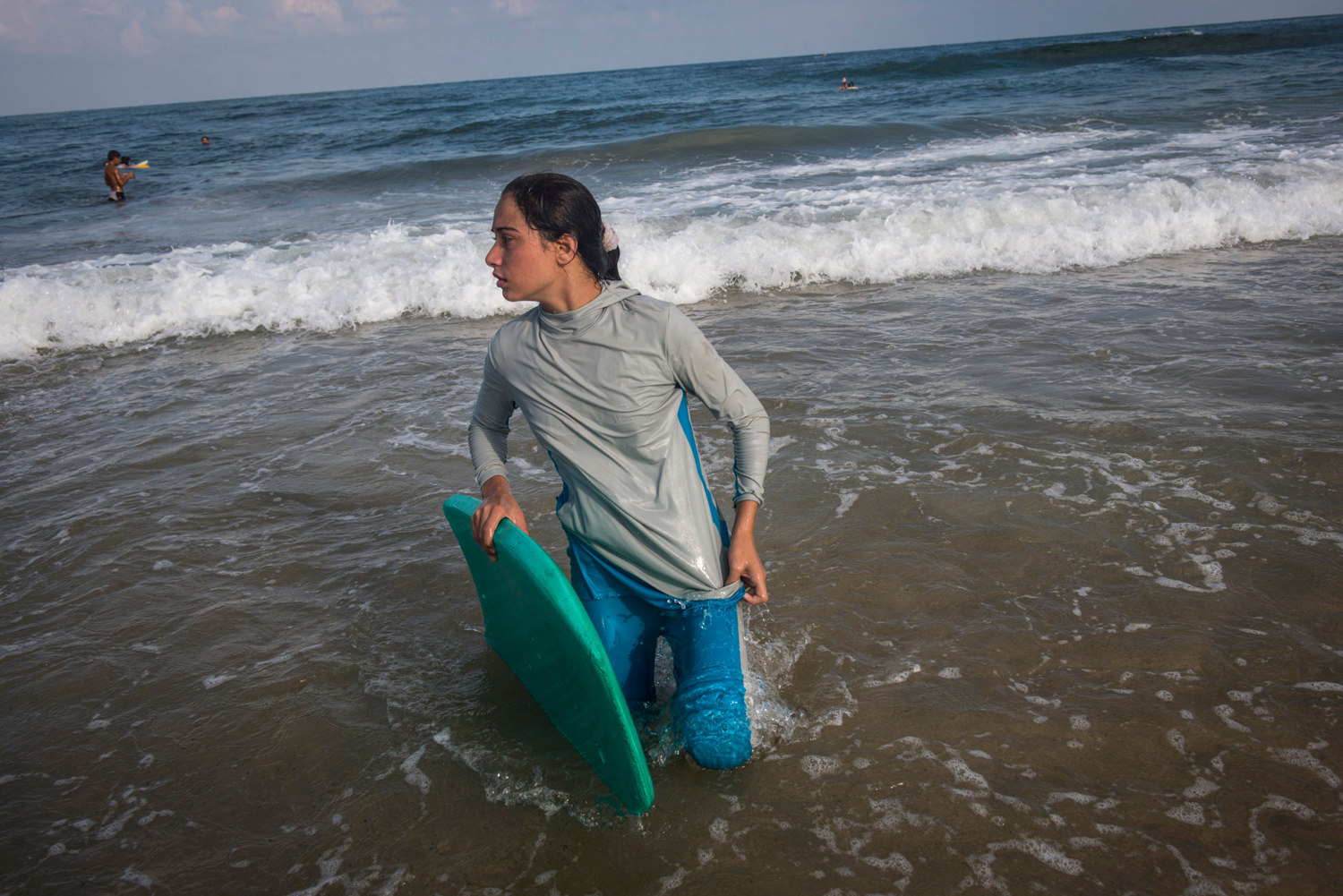
For many Gazans the sea is the only place they can be without being reminded of their isolation. Female Surfer, Sabah Abu Ghanem ,14 and her sister surf early in the morning outside of Gaza city. The sisters place first in many competitions inside the strip, but have never left the Gaza Strip to compete.
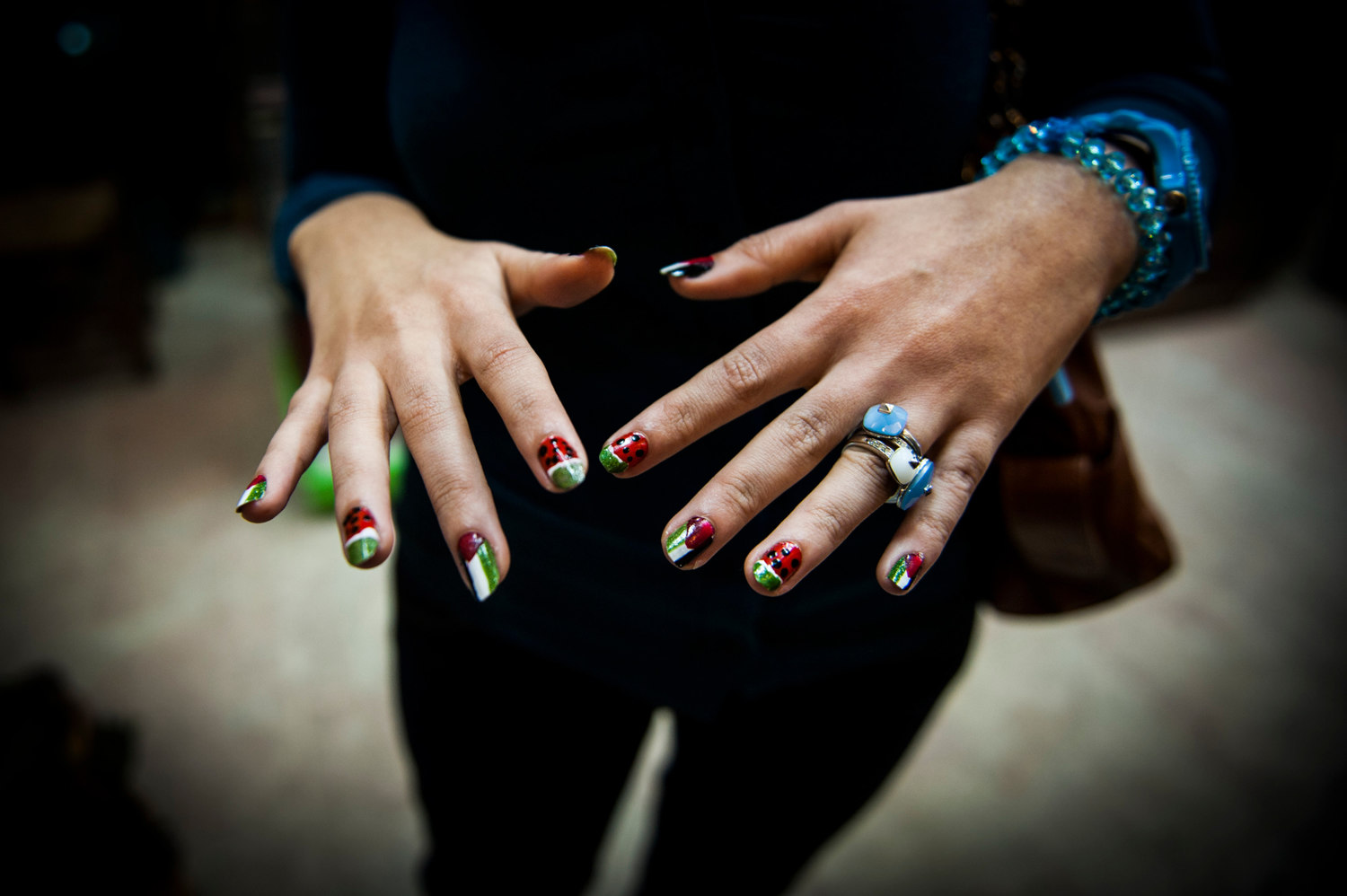
A girl shows off her Palestinian themed nails after a recent bombing campaign.
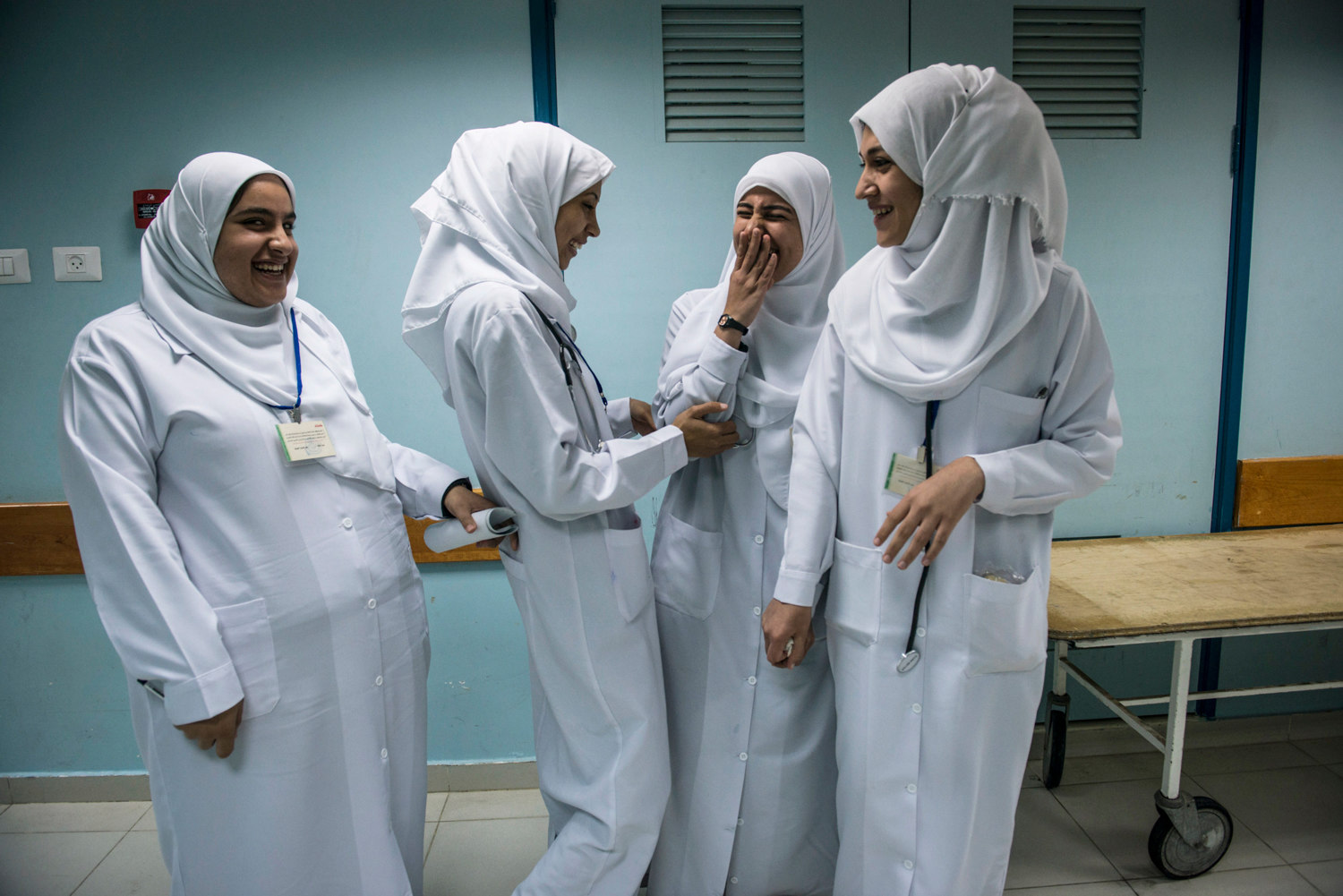
Medical students from Islamic University on break in the Maternity Ward of Al-Shifa Hospital in Gaza.
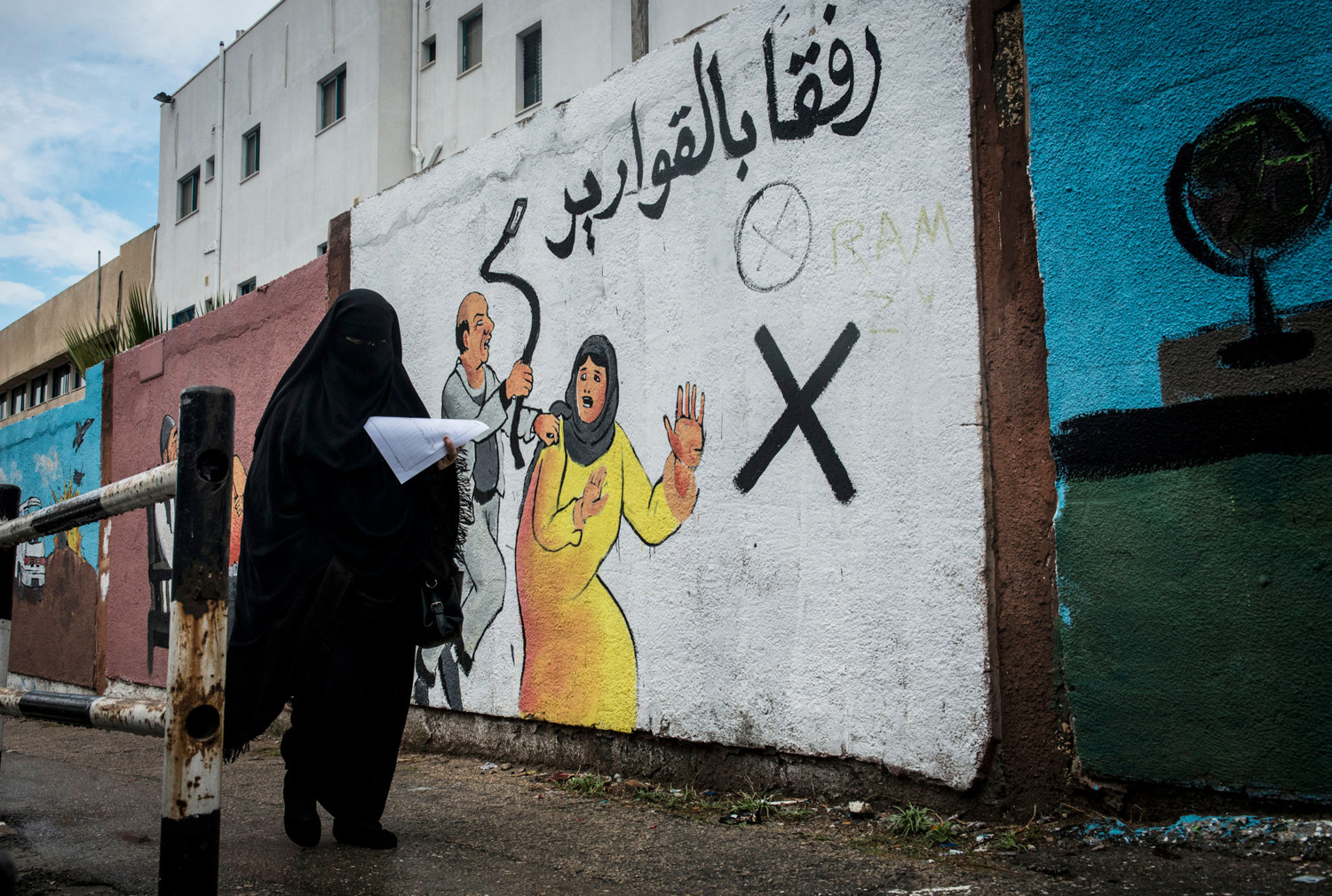
A woman walks by an mural discouraging domestic violence outside if Al-Shifa hospital. According to a 2012 study, some 37% of women are subjected to domestic violence by their husbands.
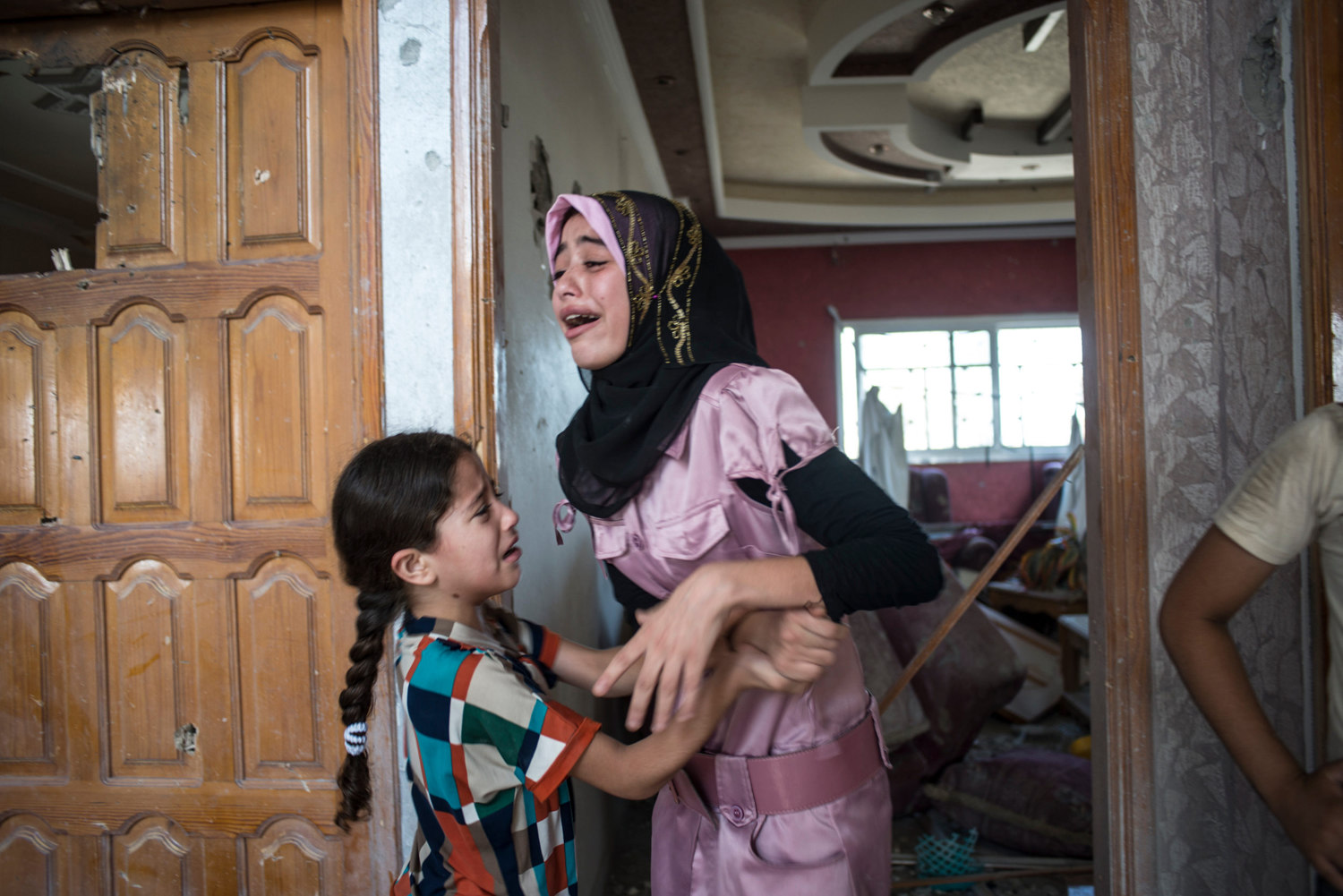
Haneen Harara, 15, and her sister Yasmeen Harara 6 cry upon seeing their family home for the first time. The sisters have lived in this house their whole life and have no where else to go. They are currently living in a UN shelter.
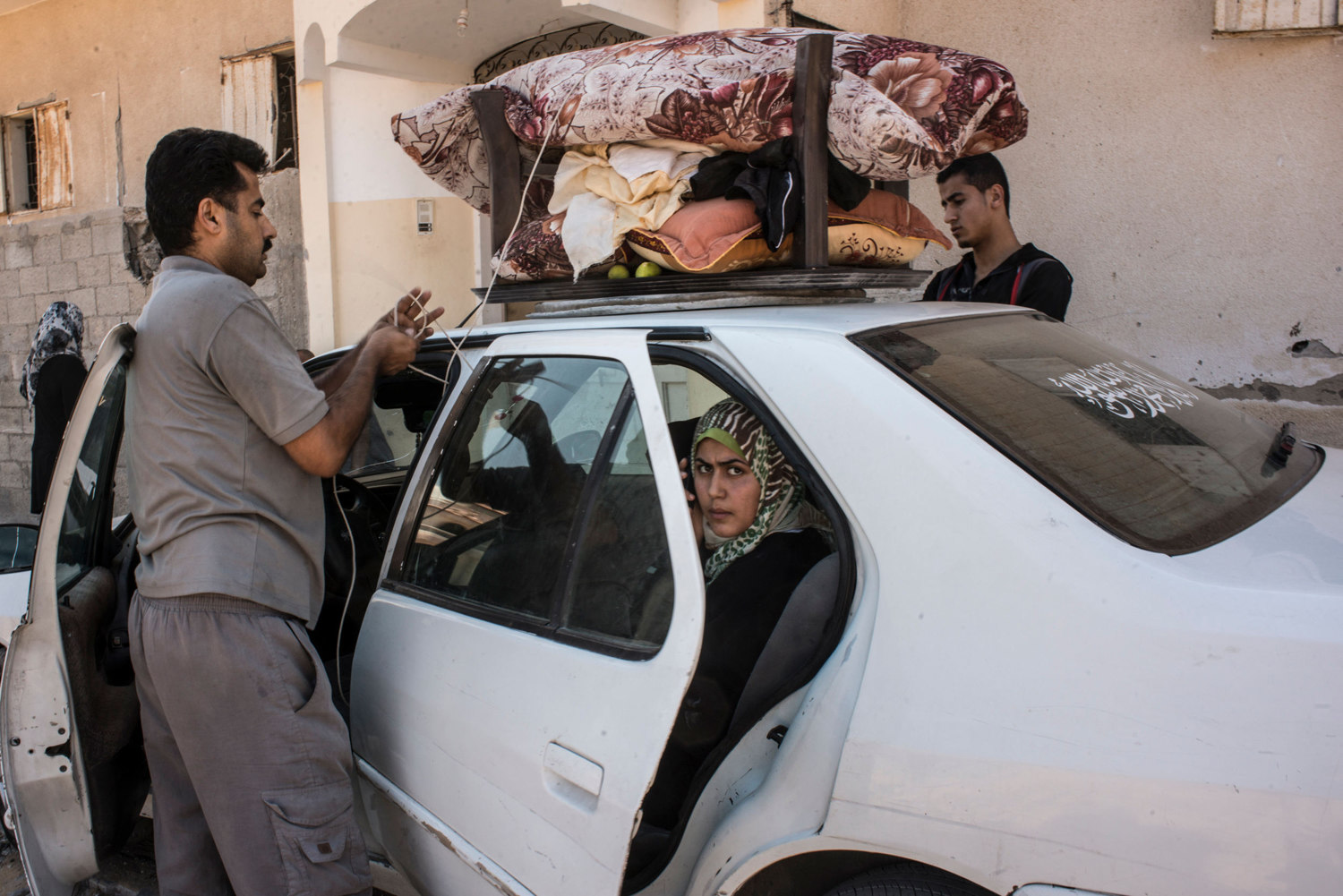
A family packs up to leave the Beit Hanoun area during a ceasefire in 2014.

Yara and her friends prepare a dance number during a blackout. Fuel is scarce in Gaza and many families only receive six to eight hours of electricity a day.
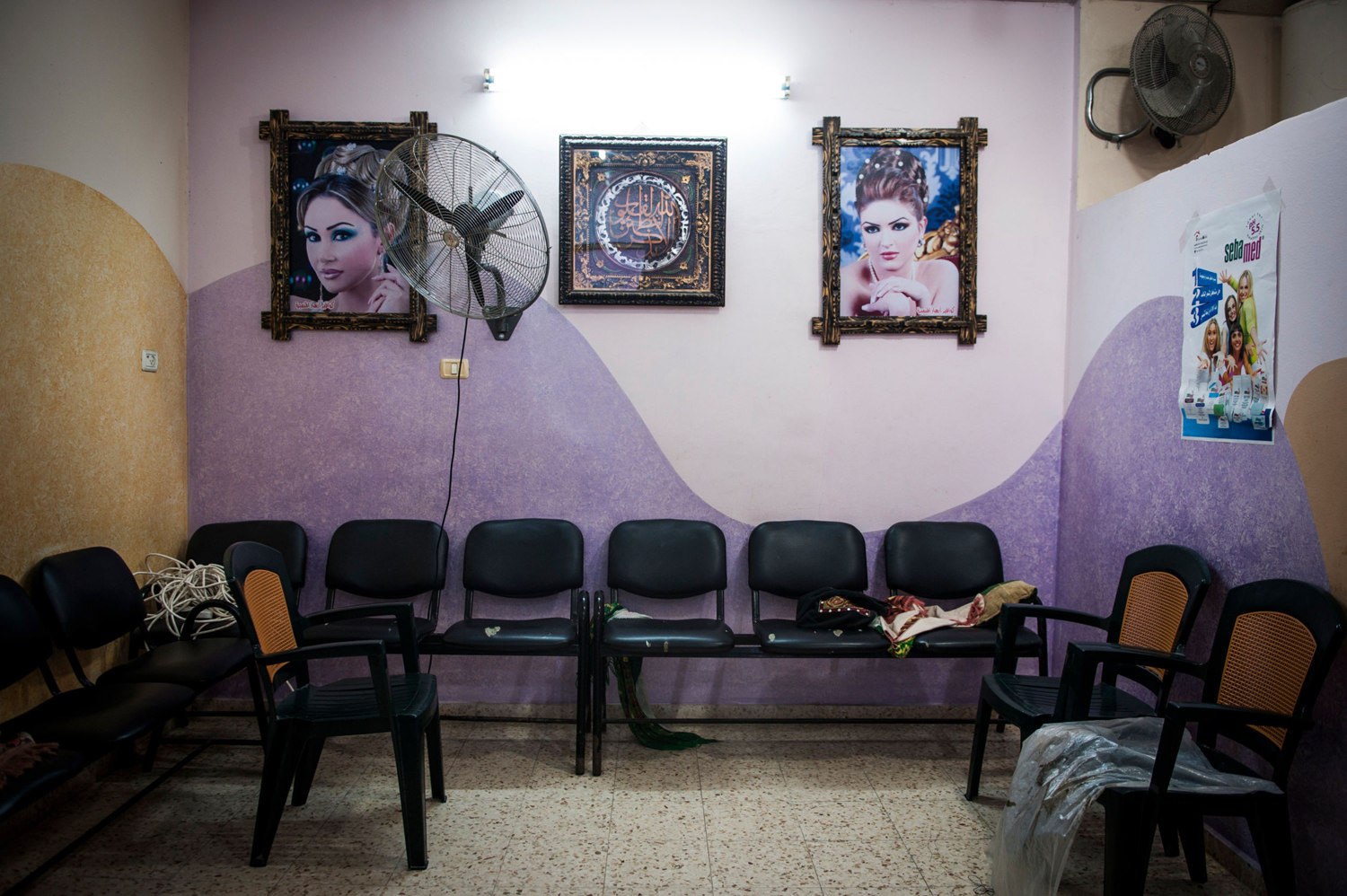
At a salon in Gaza City women come to get their hair, nails, and makeup done before weddings. In many families, a woman is not allowed to be seen without a veil by a man outside of her family, so beauty salons are for women only.
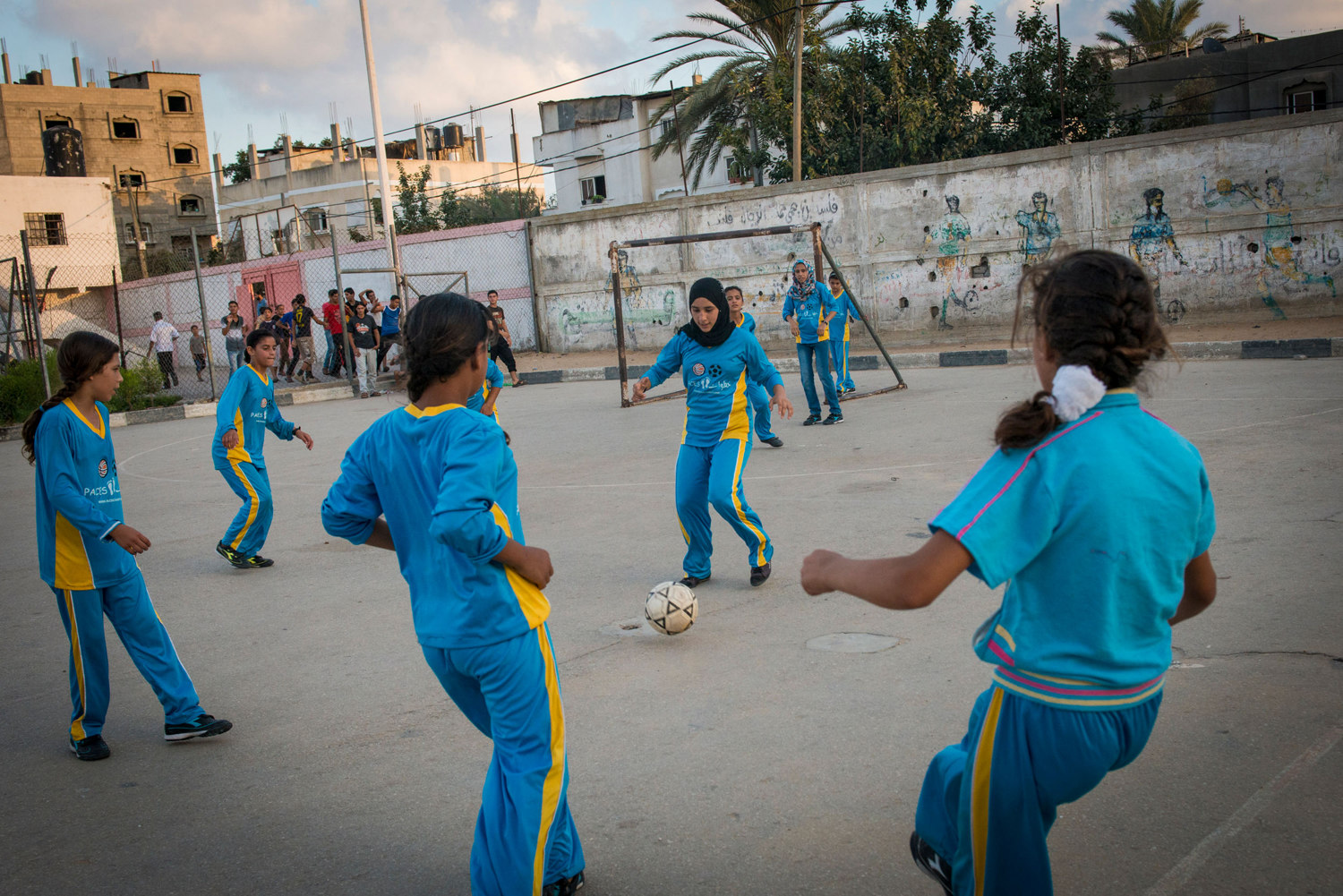
Girls play football in the Northern Gaza town of Beit Lahiyah. Women in Gaza typically do all types of sports till the age of 16, when family pressure forces them to stop as many families seek to find husbands for them.
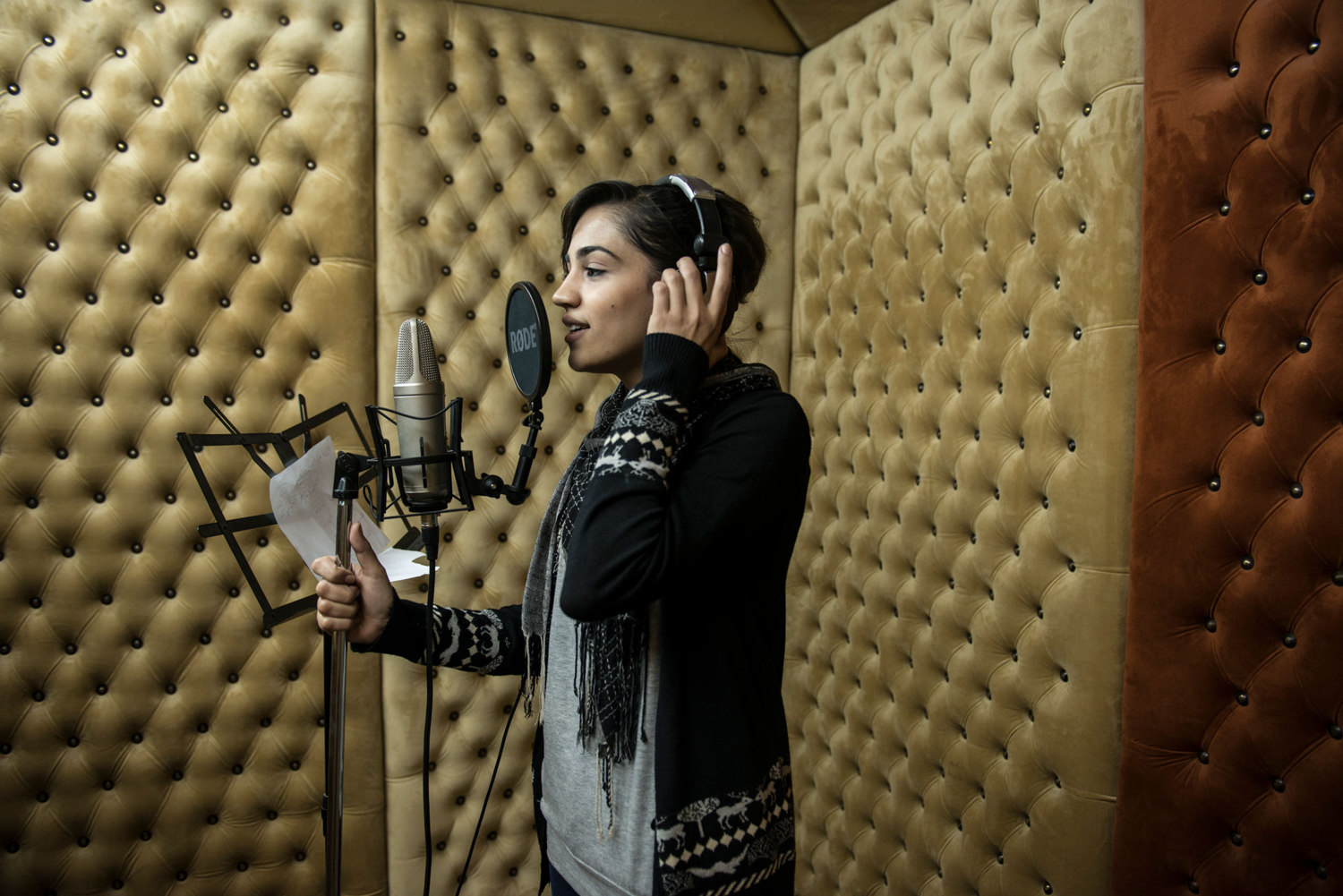
Hadeel Fawzy Abushar 25 records a song in a studio in Gaza City. Few female singers remain as families and local government look down on the practice. Hadeel started when she was 12, as all of her sisters are singers.
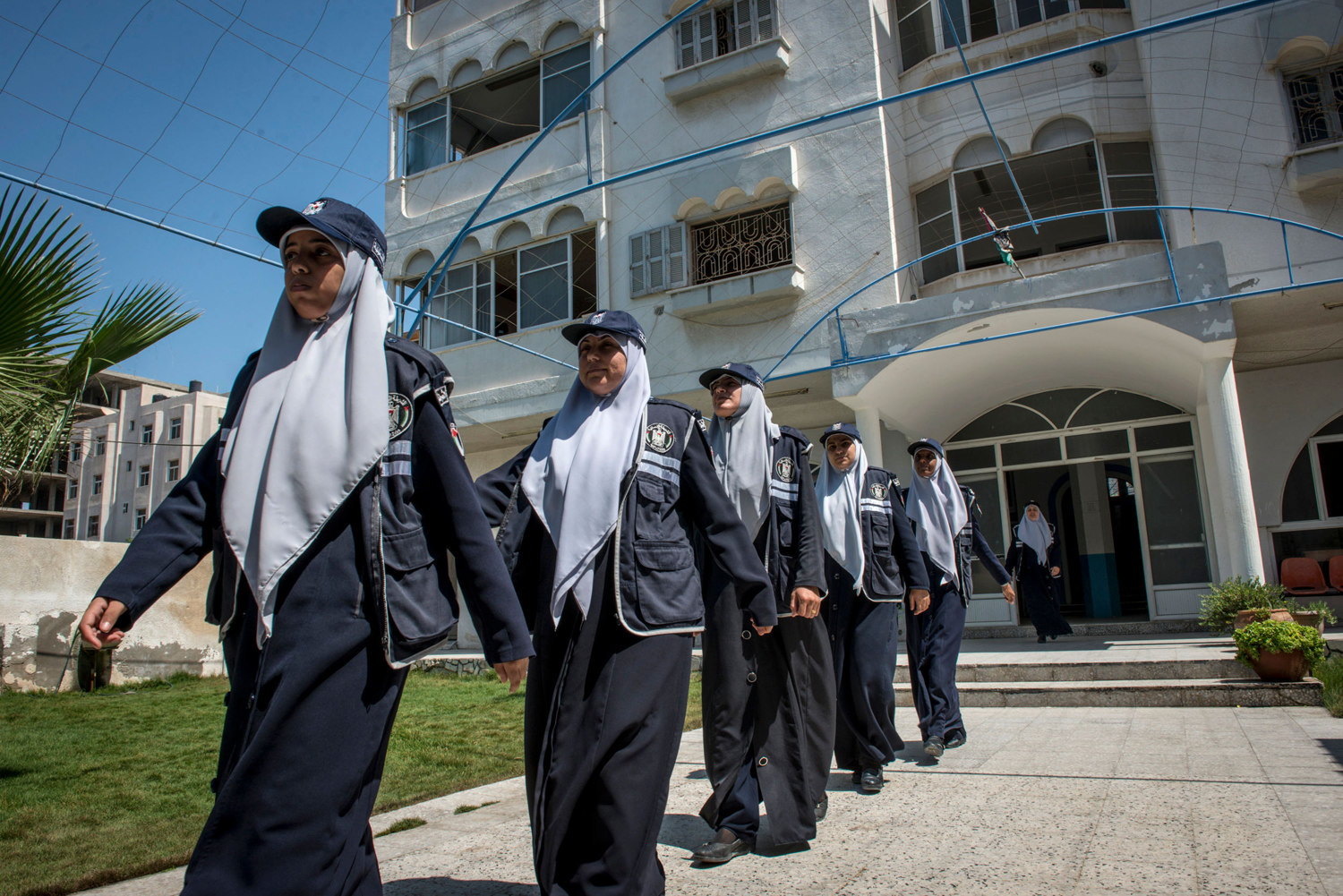
Young women train to be in the police force. Hamas prides itself on its female police force, who are helpful with domestic violence issues and law enforcement.
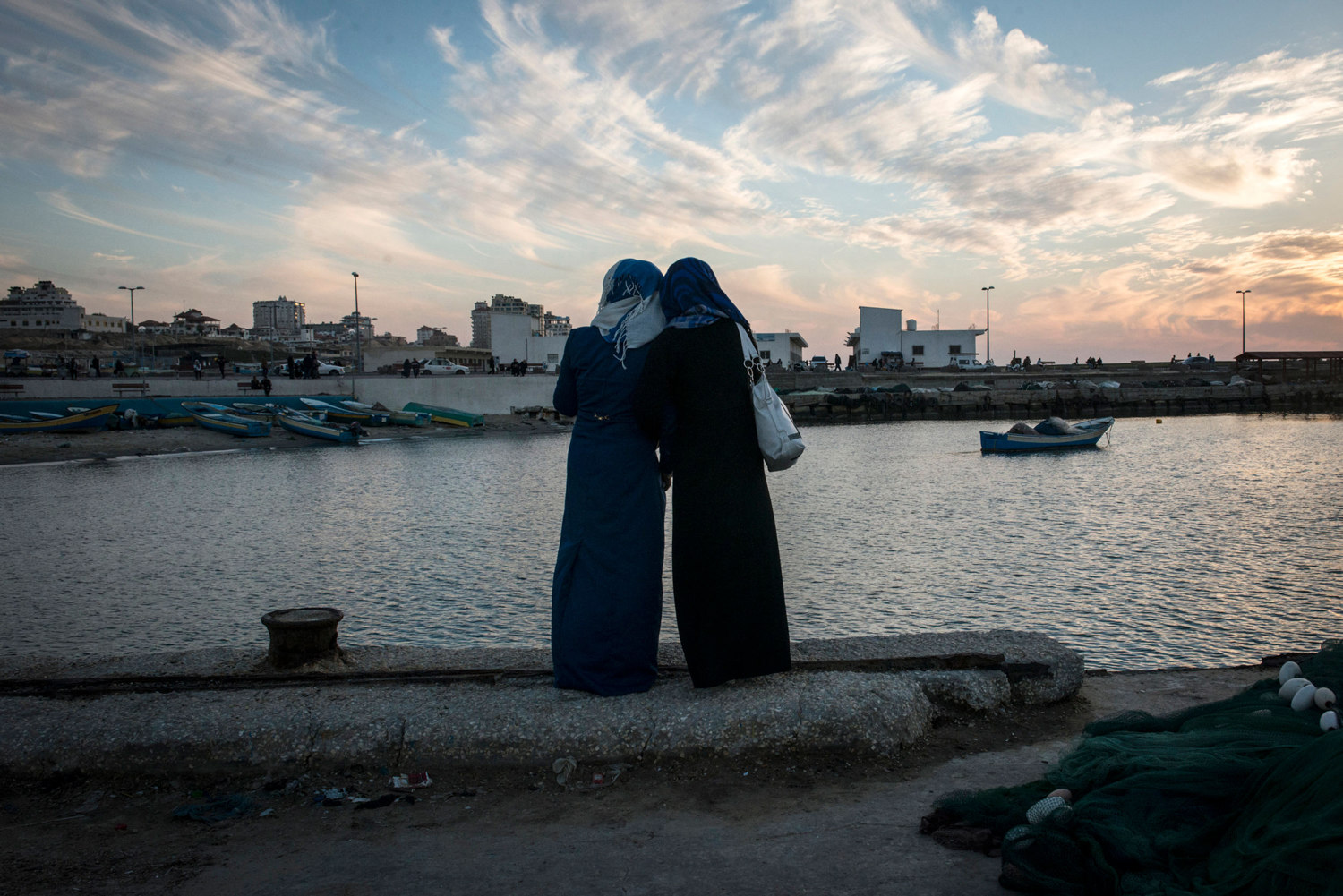
Girls watch the sun set at the harbor in Gaza City. While living in Gaza is undeniably tough, being a woman there is harder.
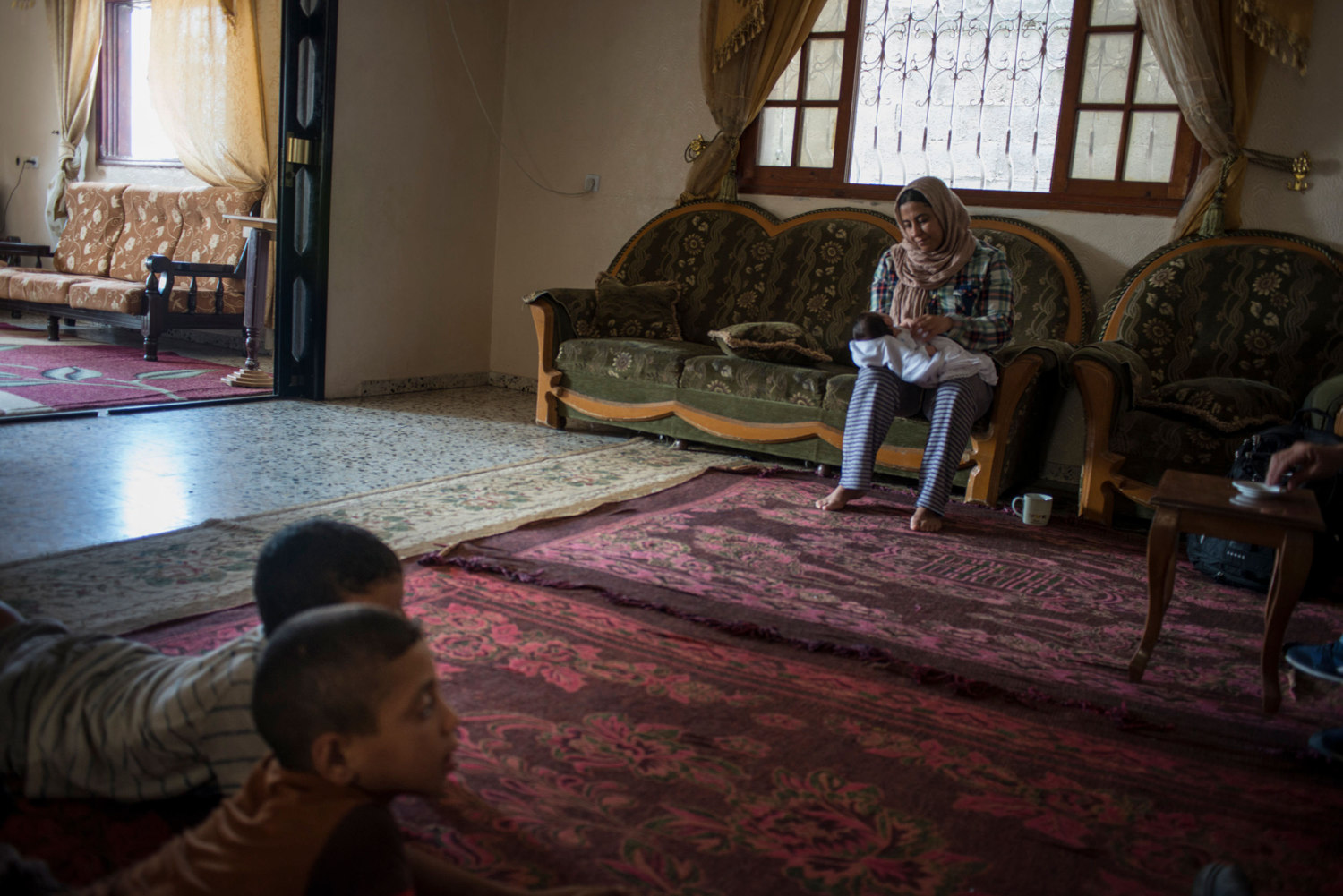
During heavy shelling in the southern city of Rafa, Marwan spends time with her niece, children and extended family who have been evacuated to her house. Three families are now living where one lived previously and there are 60 people in the building.
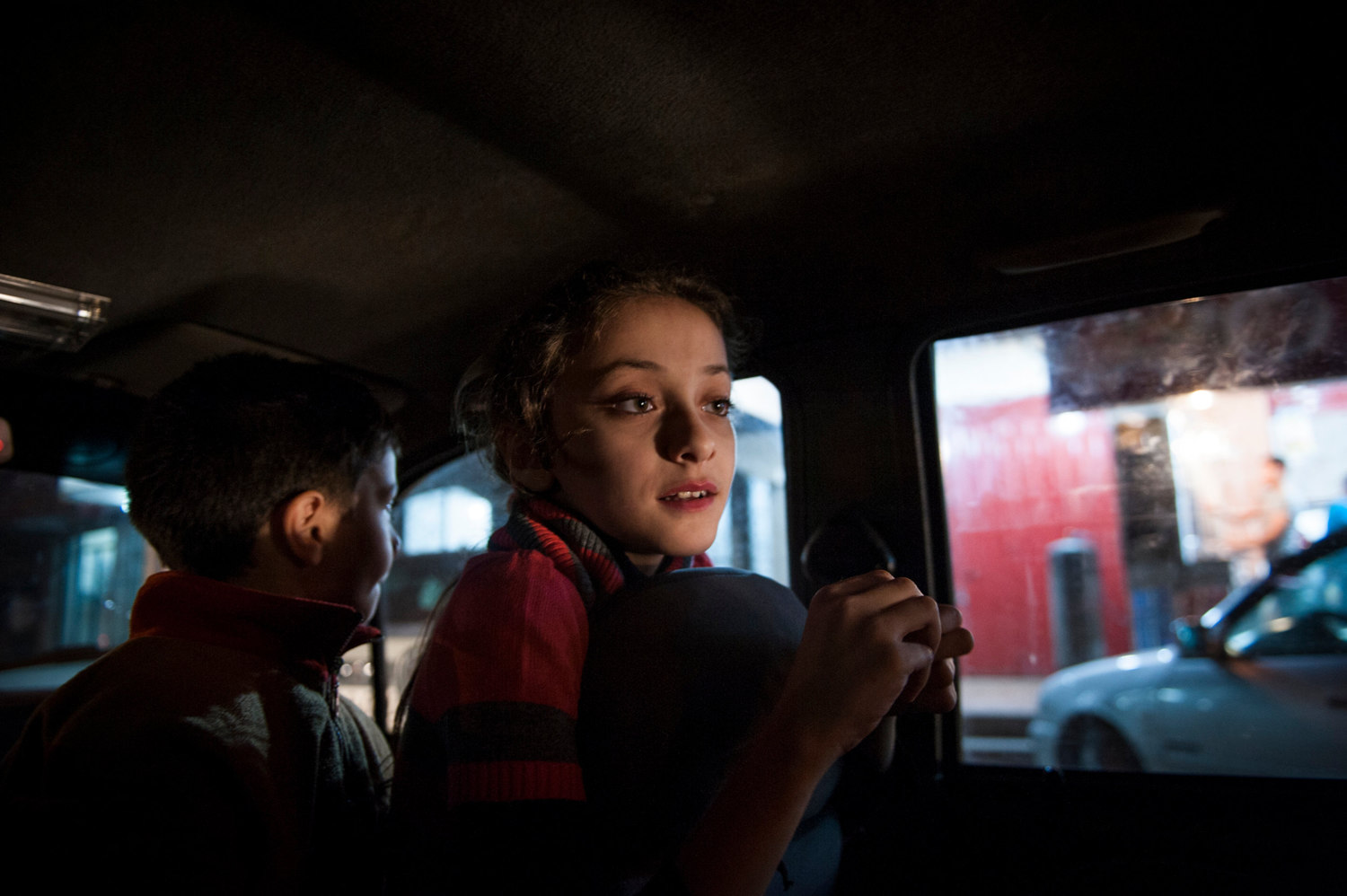
Yara and her brother waiting for their father to return with schwarma as an evening treat after a recent conflict ended.
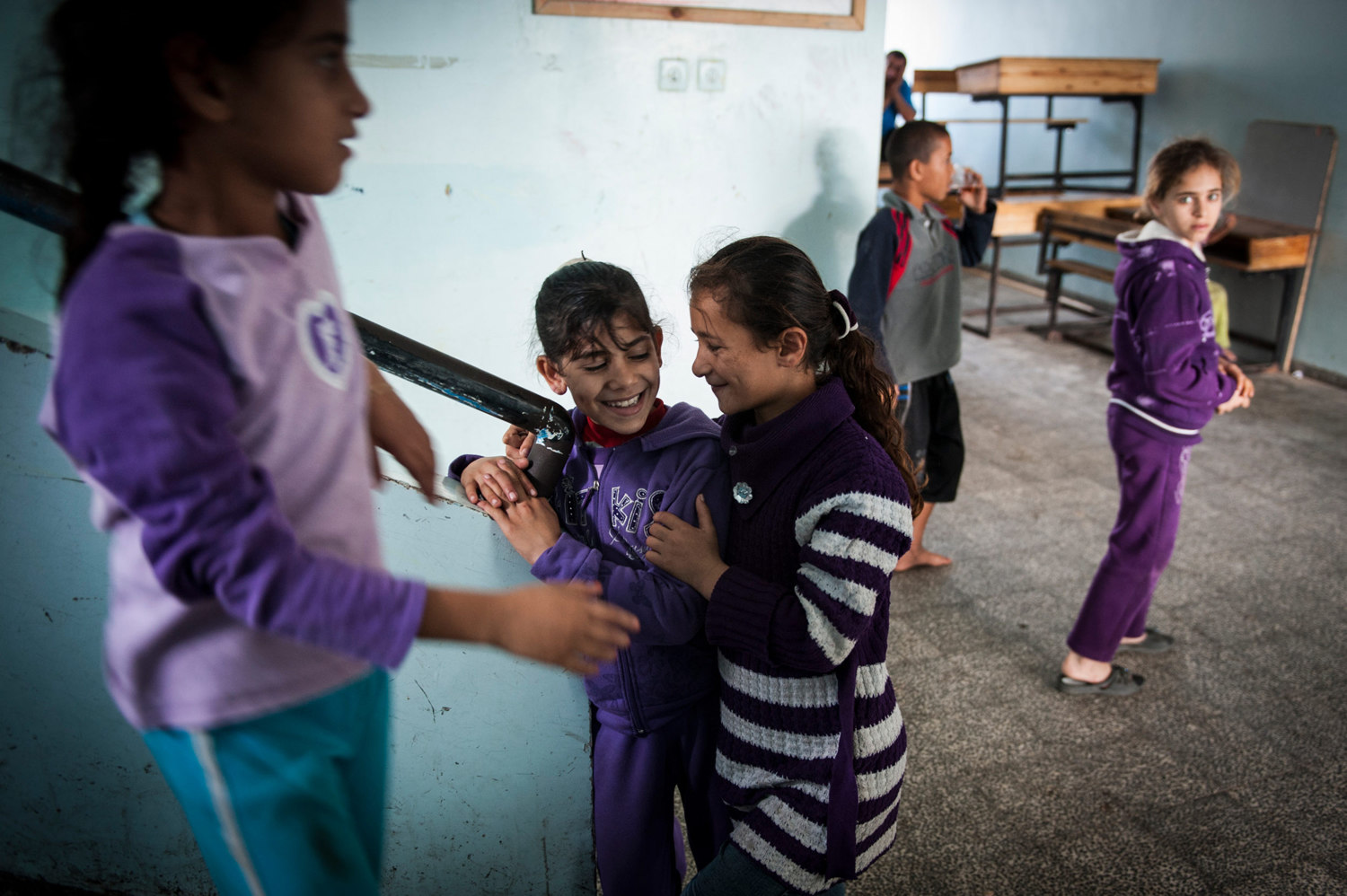
Girls living in a UNHCR shelter share a brief moment of fun between the shelling. In November 2010 when the Israeli Army heavily bombed parts of Gaza, refugees waited the siege in a United Nations Relief Works Agency school in Gaza City.

Few girls in Gaza are uncovered, here Doaa carefully does her hijab before leaving the house.
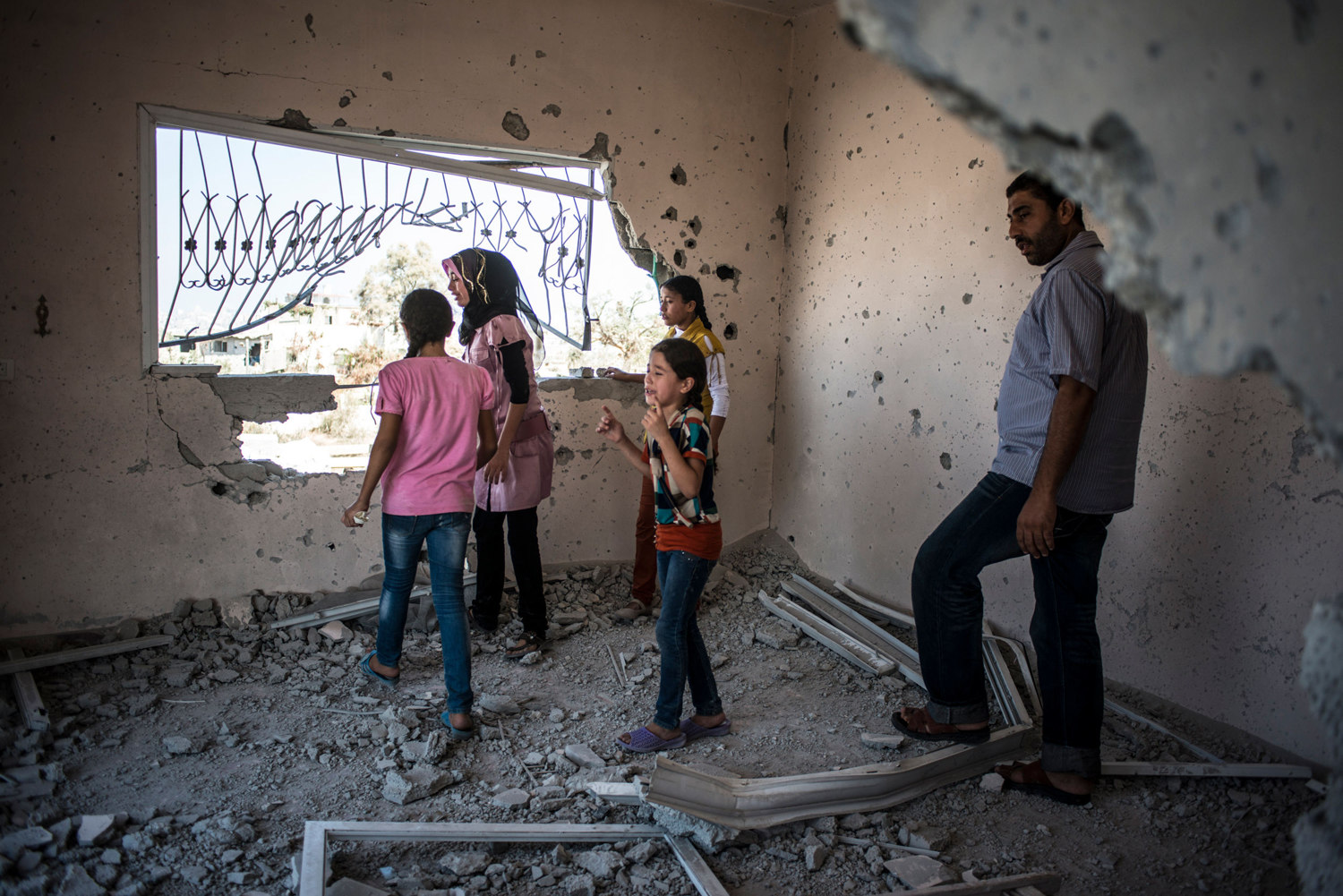
Haneen Harara, 15, and her sister Yasmeen Harara 6 cry upon seeing their family home for the first time. The sisters have lived in this house their whole life and have no where else to go. They are currently living in a UN shelter.
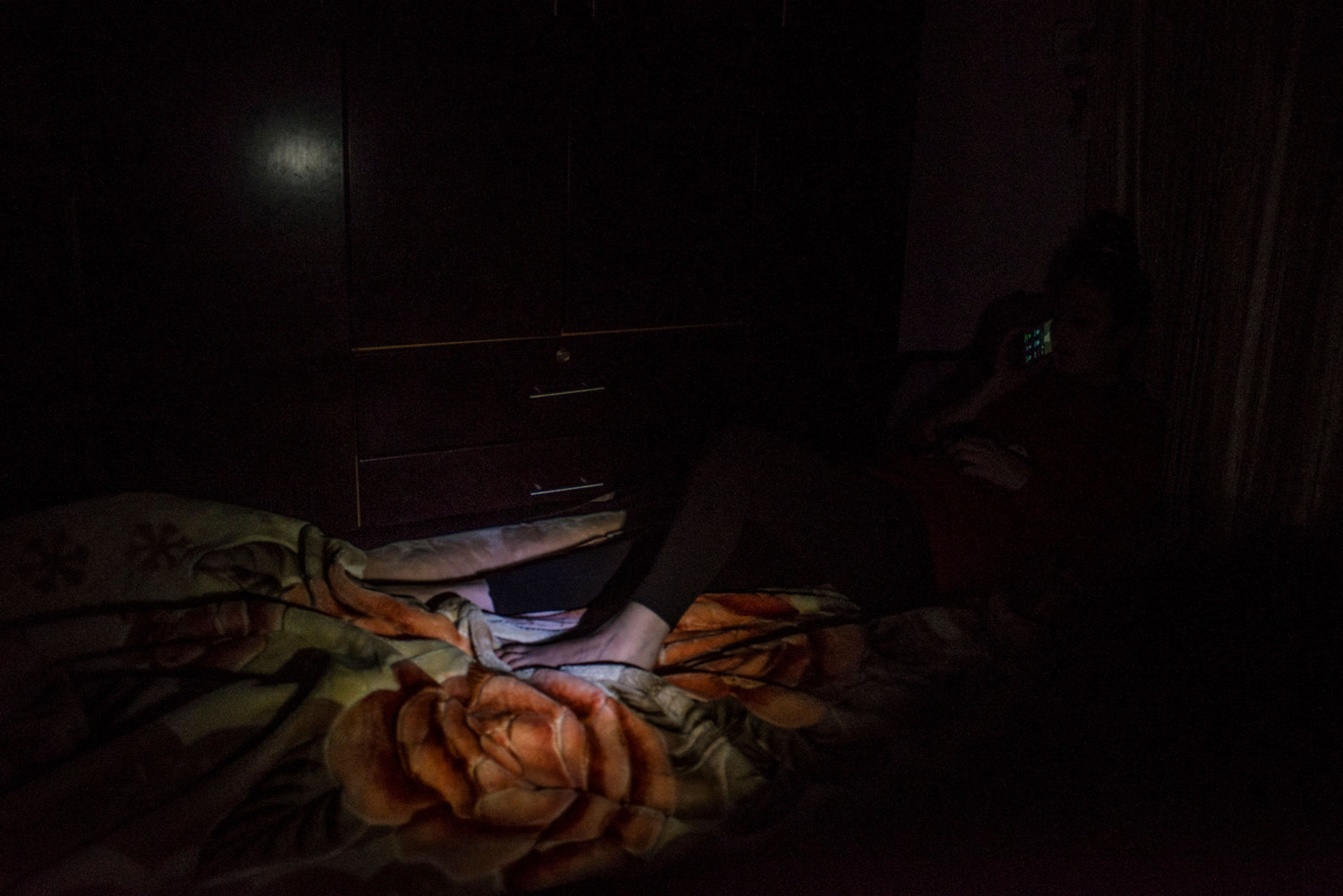
Doaa calls her mother in Tel Aviv during a blackout. Many hospitals in Gaza cannot care for severly sick or wounded people and they are transferred to hospitals in Israel. Her mother is escourting her grandson whos pancreas has burst.
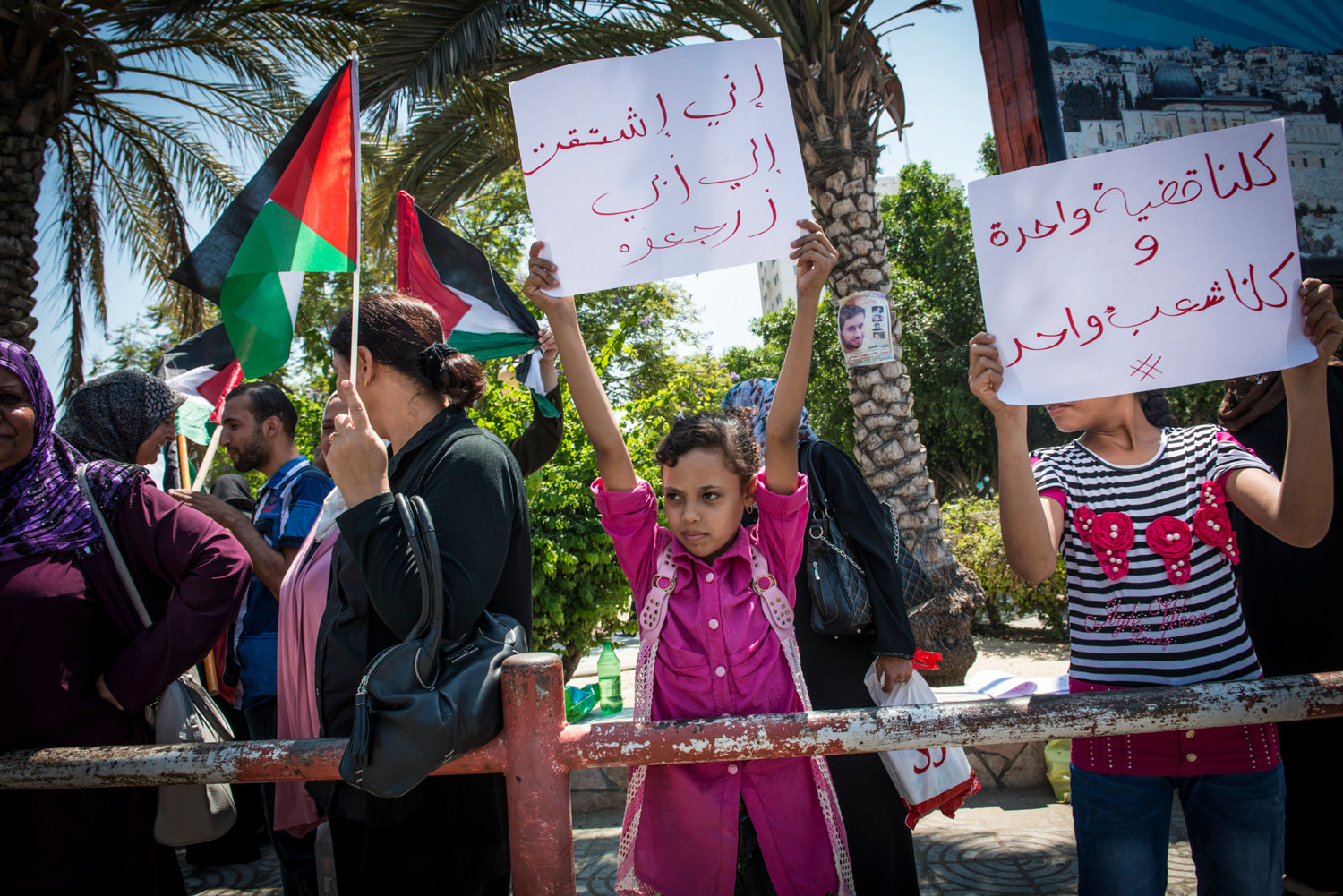
A young girl hold up a sign saying 'I really miss my dad. Bring him back home' at weekly protest for women against the partition of Gaza and the West Bank.
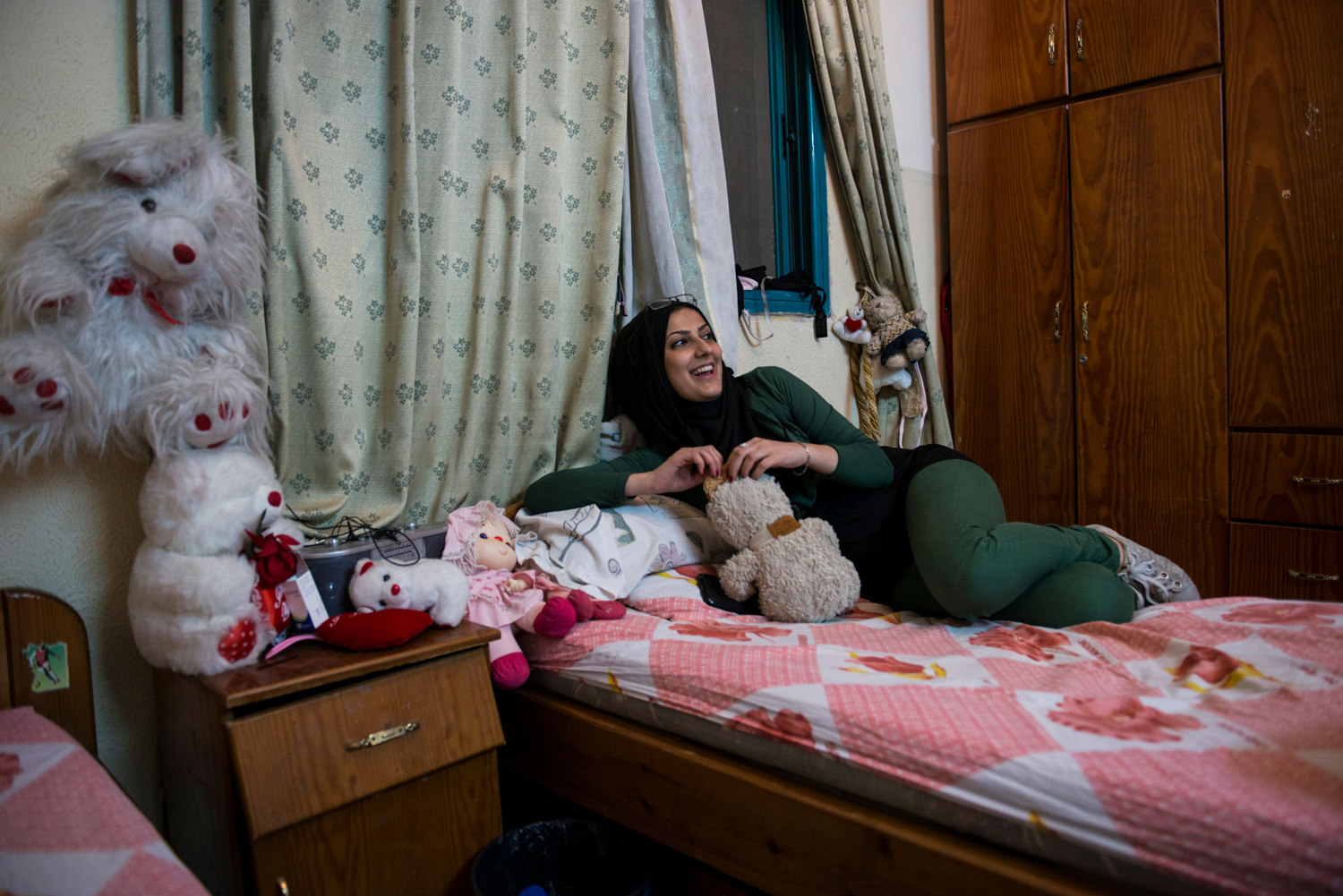
Doaa in a friends bedroom. Girls that are un-married have few places to be themselves. Bedrooms and private cars are sanctuaries where girls can sing and dance without being judged by the public, or their own families.
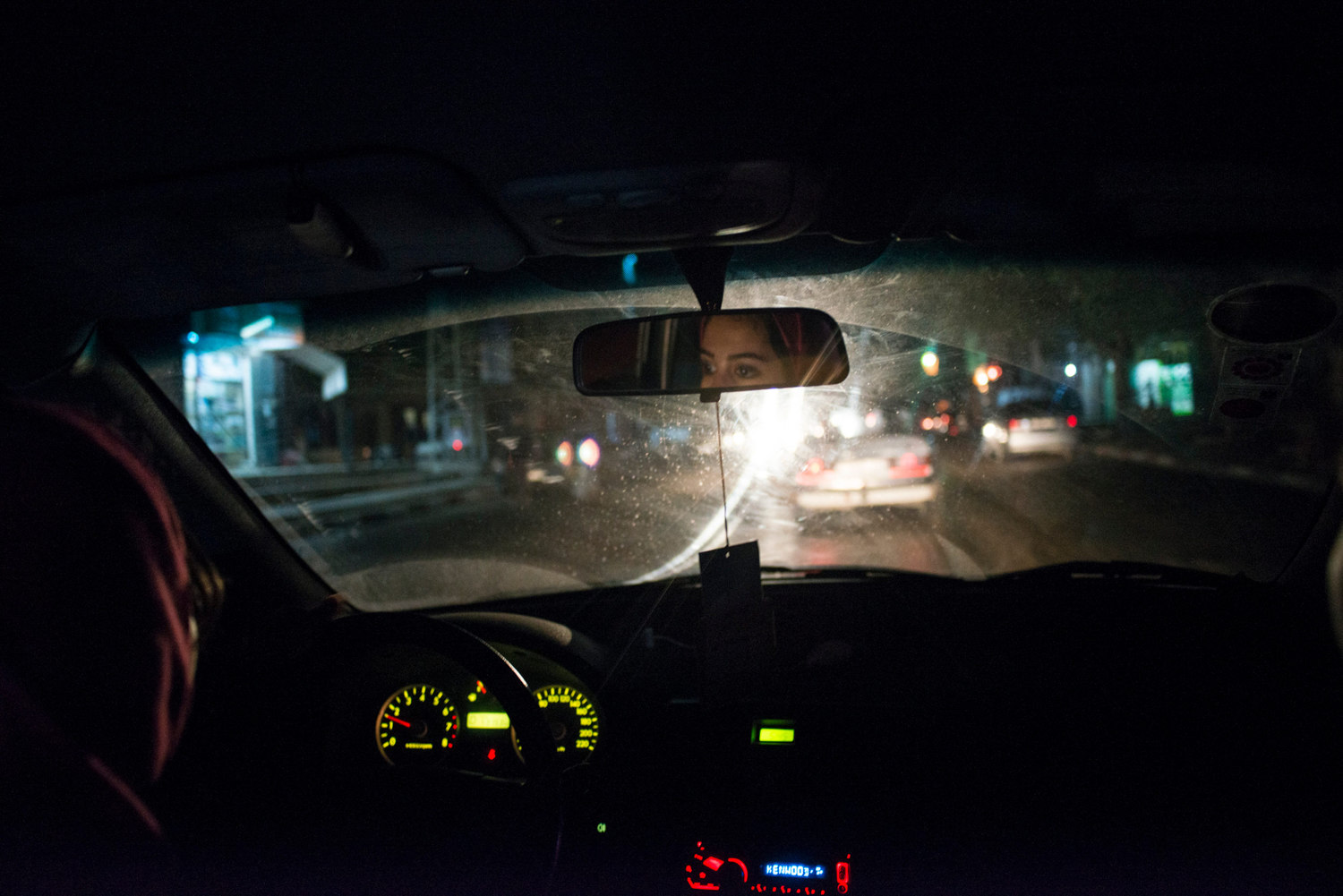
Female drivers are rare but some liberal families allow their daughters to drive. Here Meera, has her own car and drives freely.
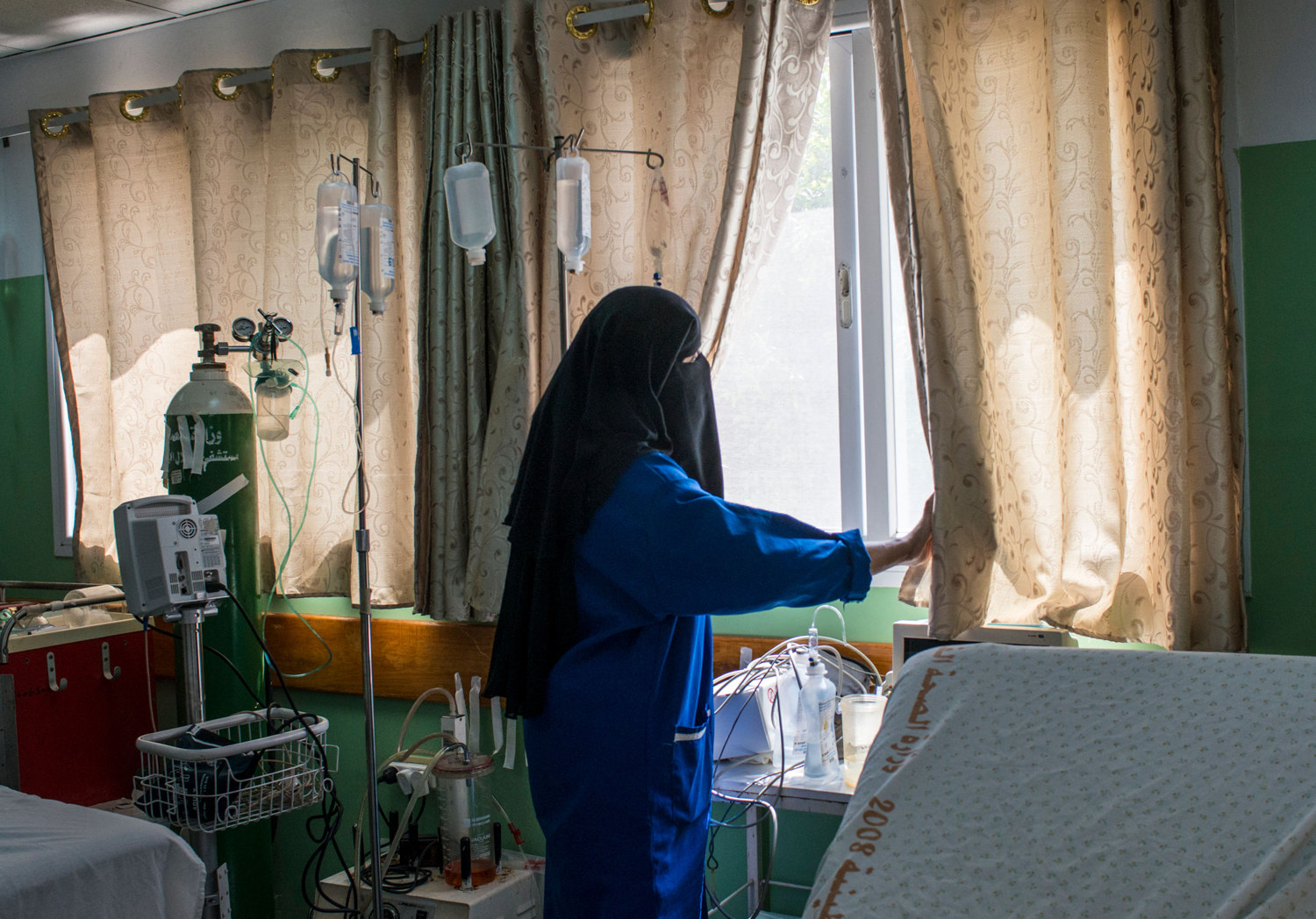
A nurse looks out the window of a hospital in Rafah waiting for more ambulances to bring in corpses after the ground invasion in Gaza.
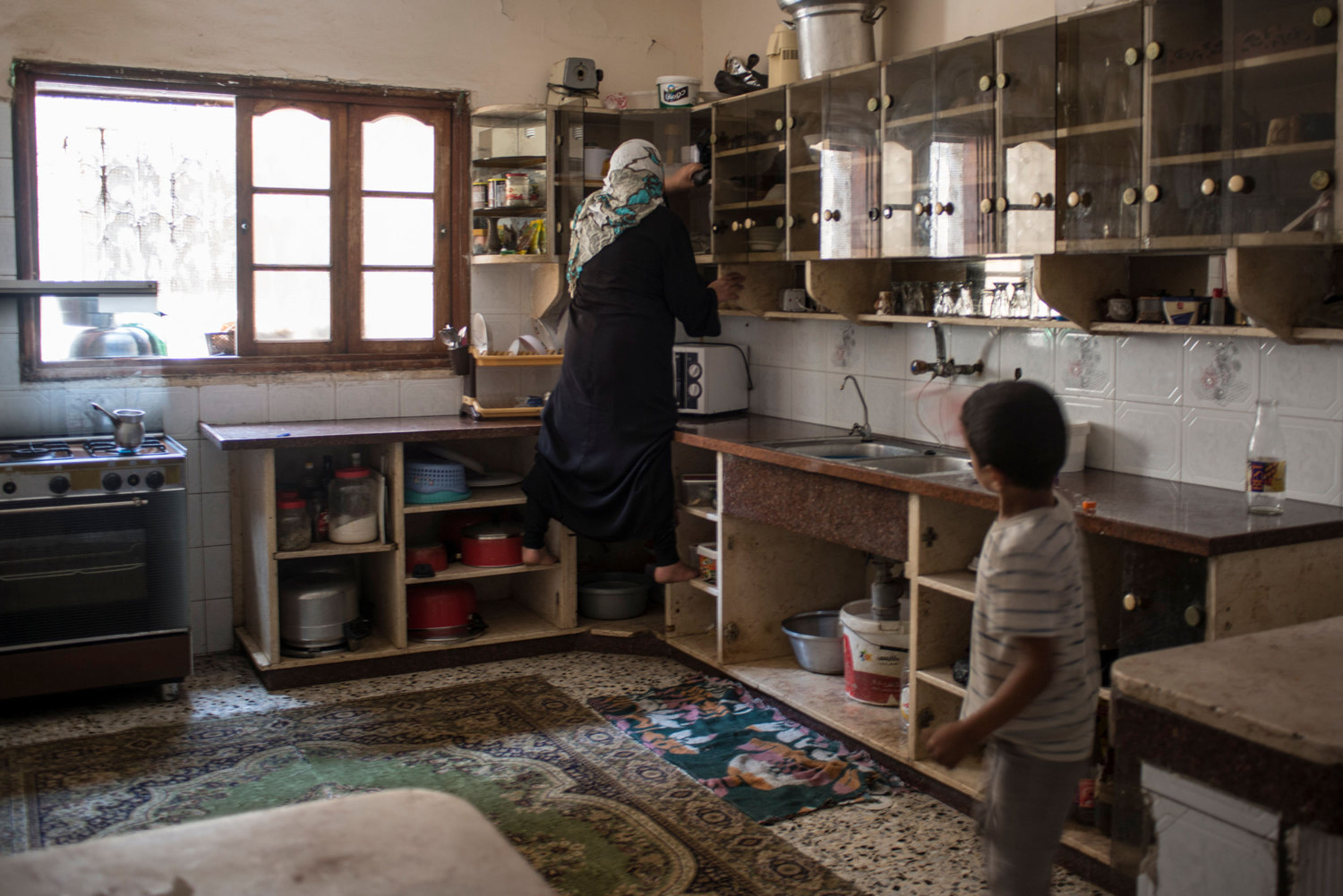
A girl picks through the rubble at what was previously her families home in Beit Hanoun, Gaza.
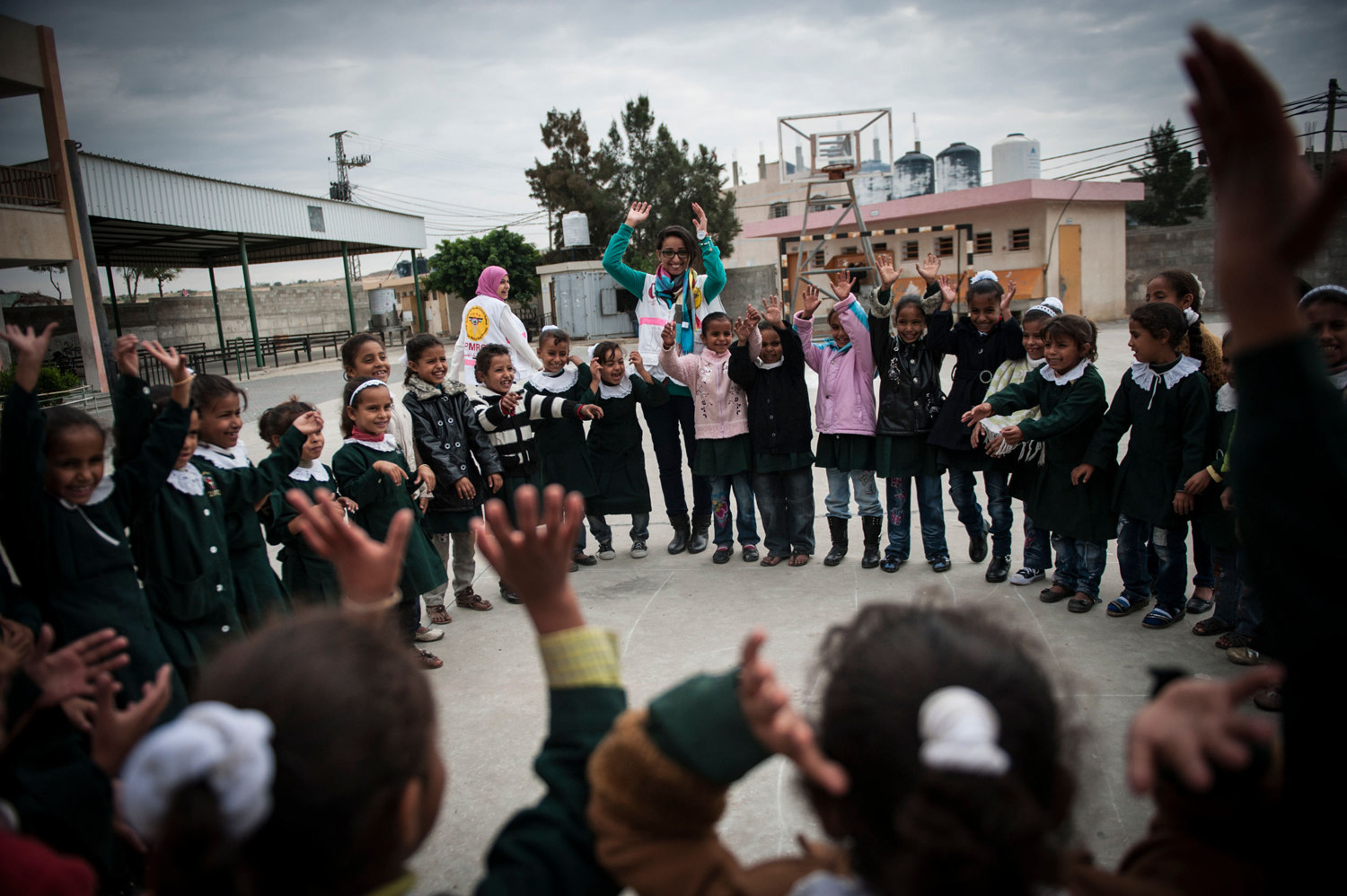
Nisreen Shawa, a worker for the Palestinian Medical Relief Foundation at the Hamza Bin Abd-el Muttalib School where they do art therapy and exercises with girls after the recent bombings.
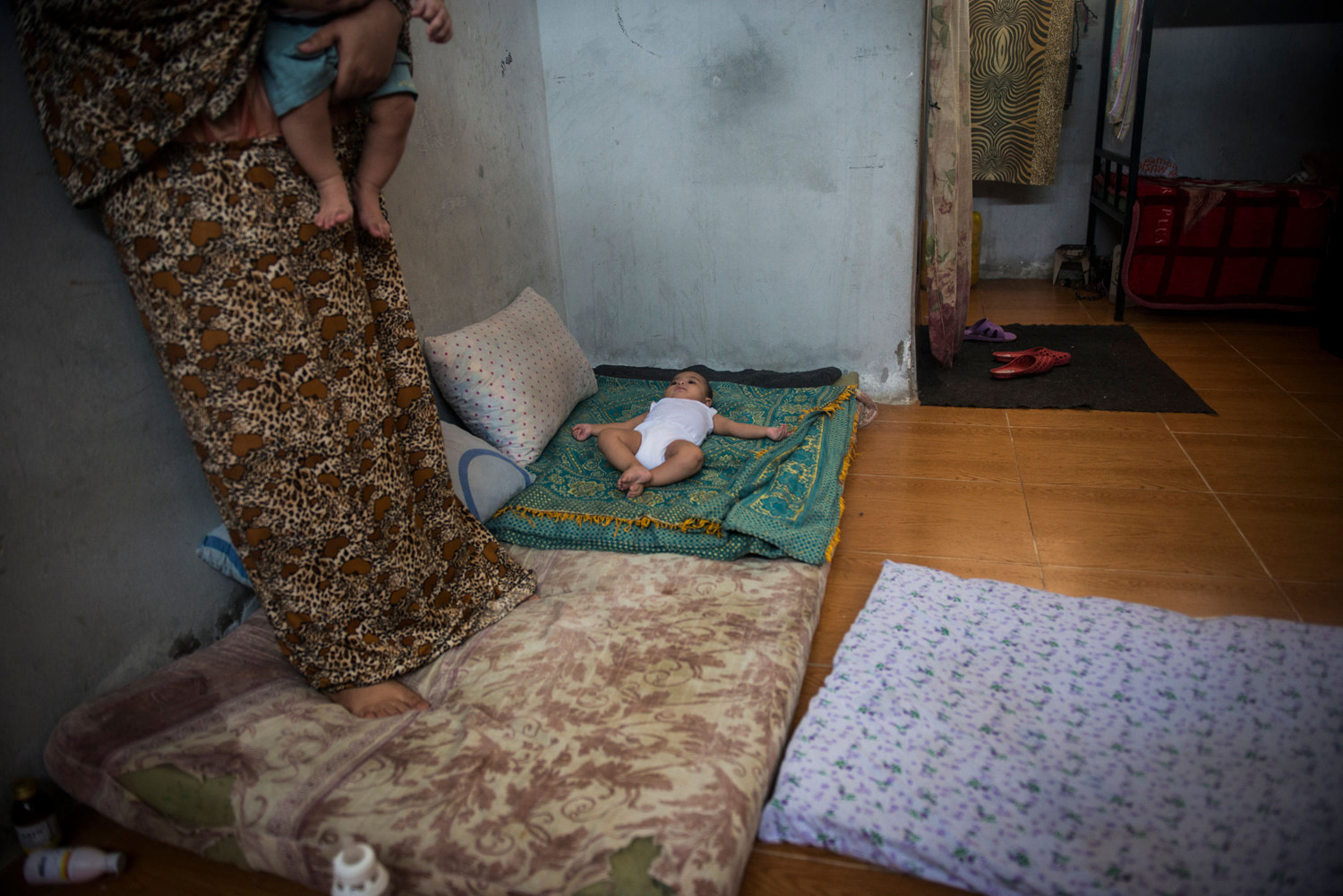
In the women's prison in Gaza, inmates who are pregnant, or have young children must take them with them when they are imprisoned, if a family member will not care for their children. Often the woman is shamed by her family and they won't care for the child. Many children grow up in jail this way.
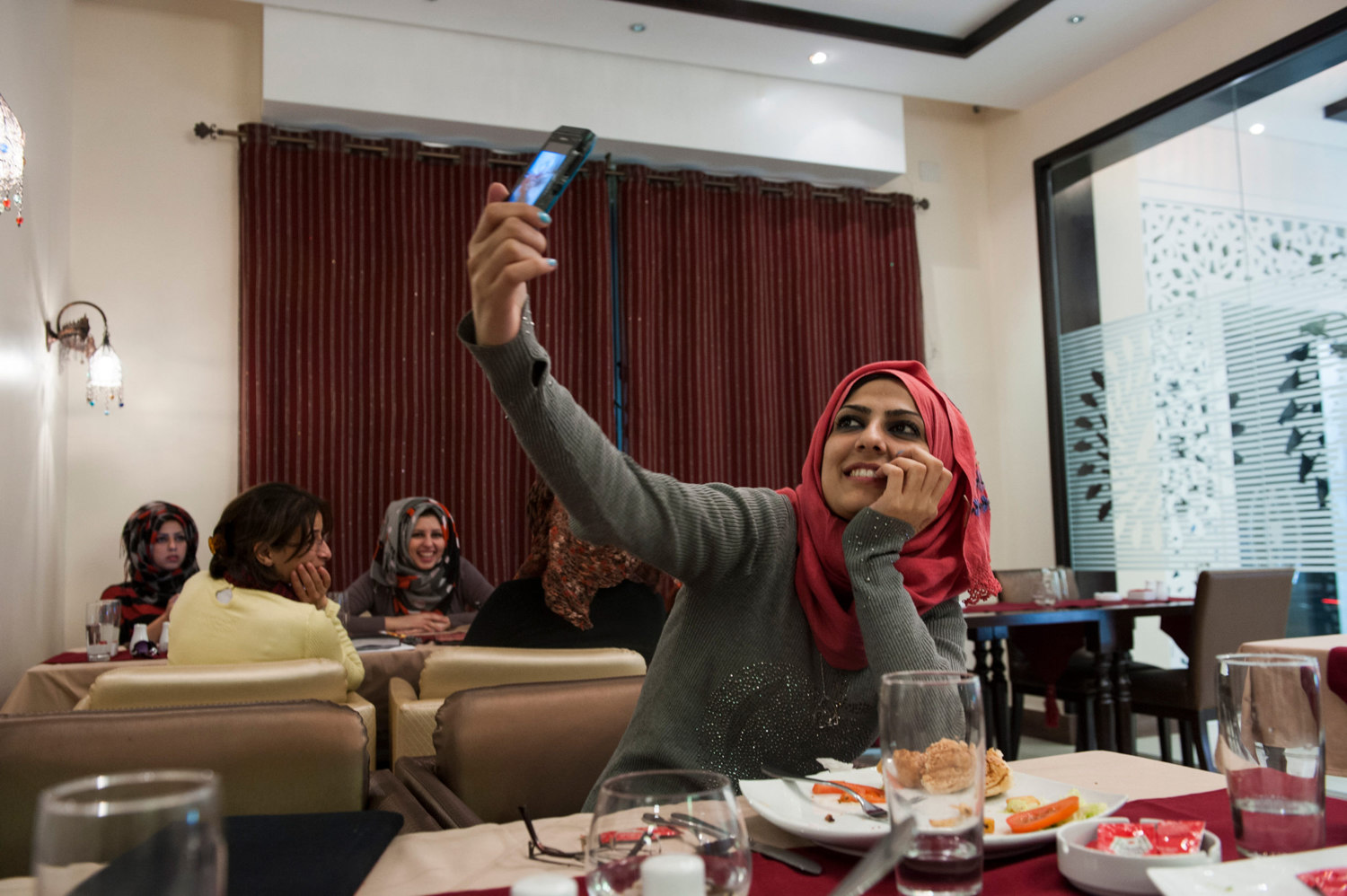
Doaa takes a picture of herself in a trendy cafe in Gaza City.
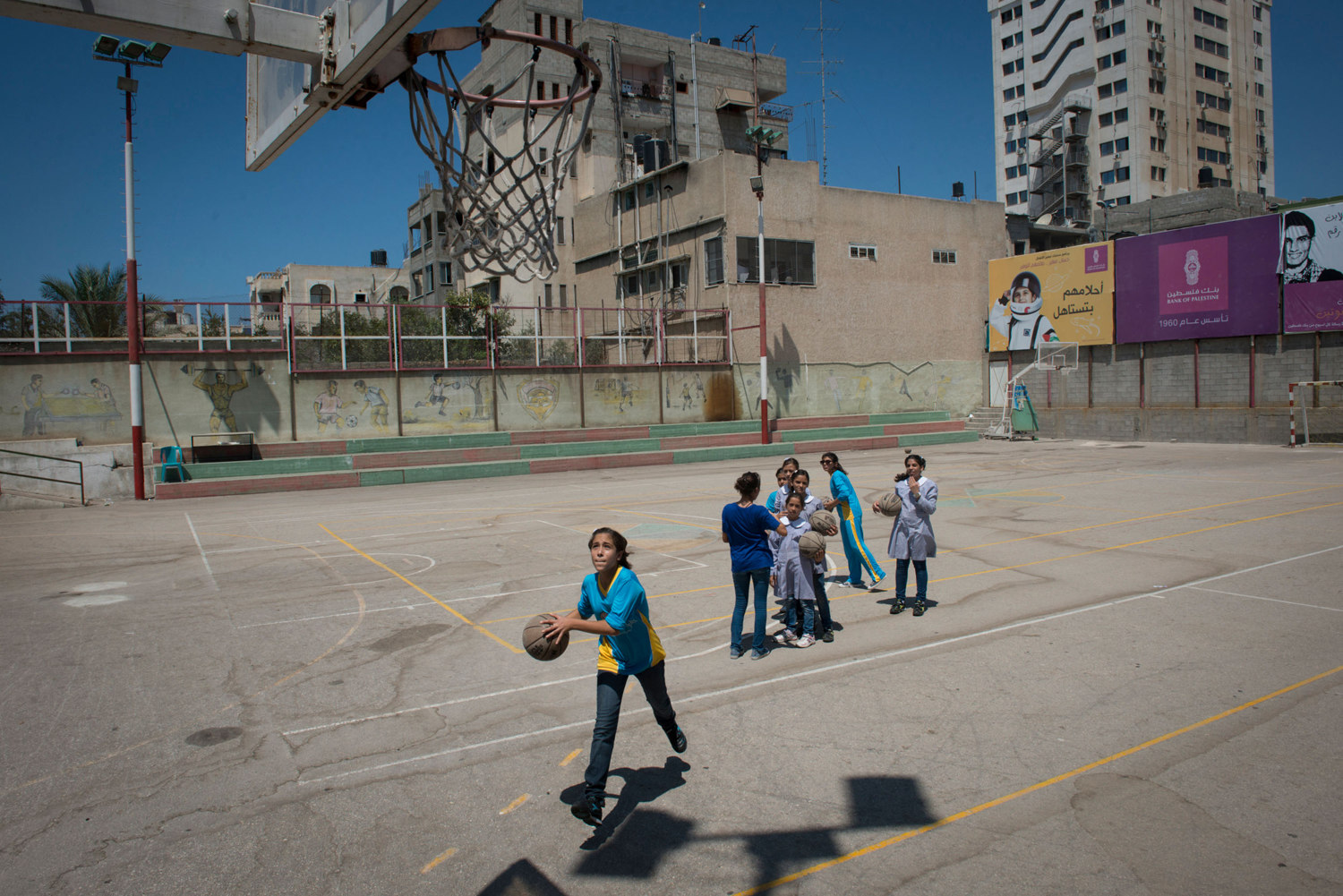
Girls play Basketball at the Gaza Athletic Club, one of the oldest sporting clubs in the country. The practice is sponsored by PACES, a charity that works to get girls active. Women in Gaza typically do all types of sports till the age of 16, when family pressure forces them to stop as many families seek to find husbands for them.
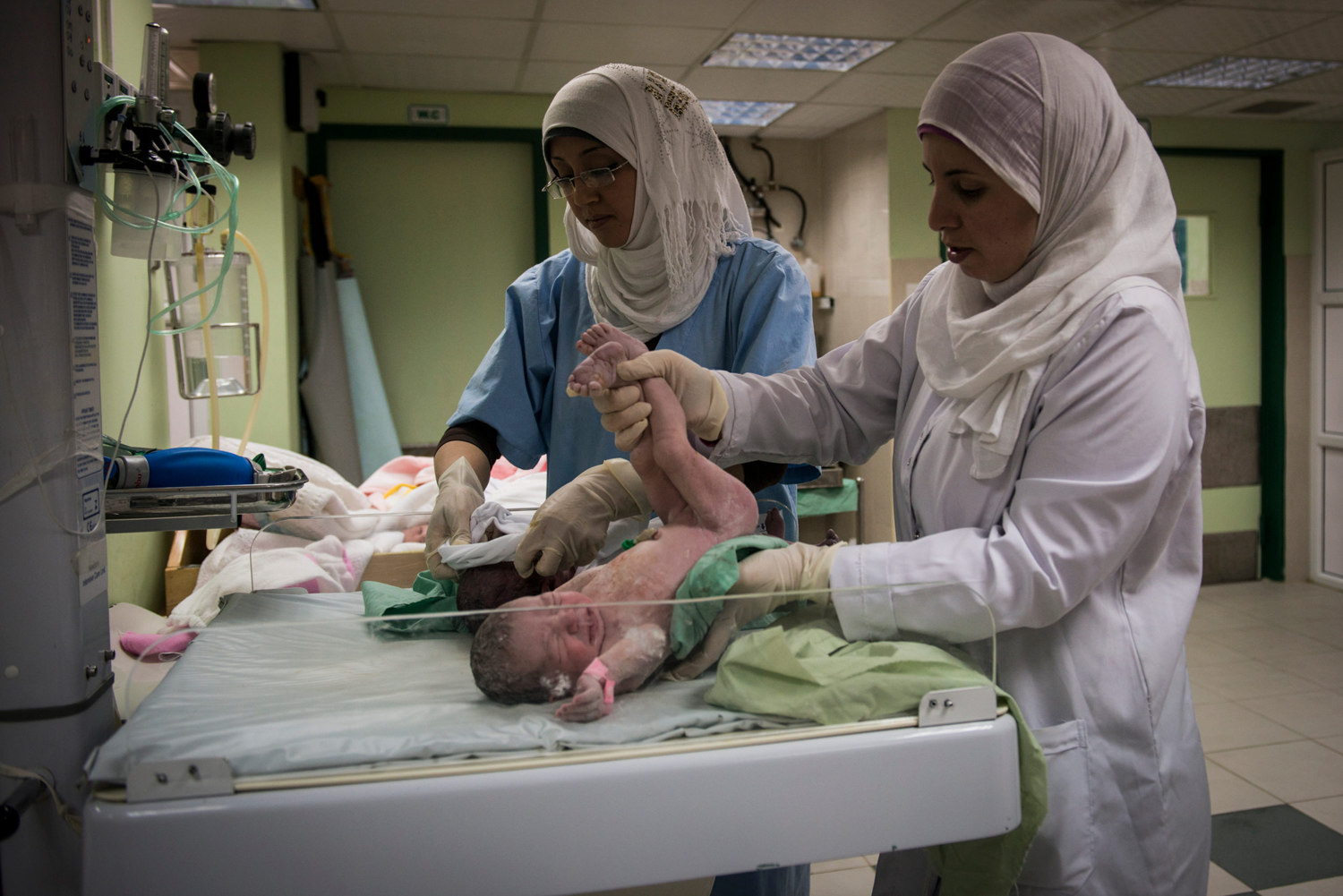
Nurses at Al-Shifa hospital clean and weigh two newly born baby girls. As most families put pressure on having many male children, the arrival of a girl is celebrated, but not as much as a male child as males are the heads of the house and breadwinners.
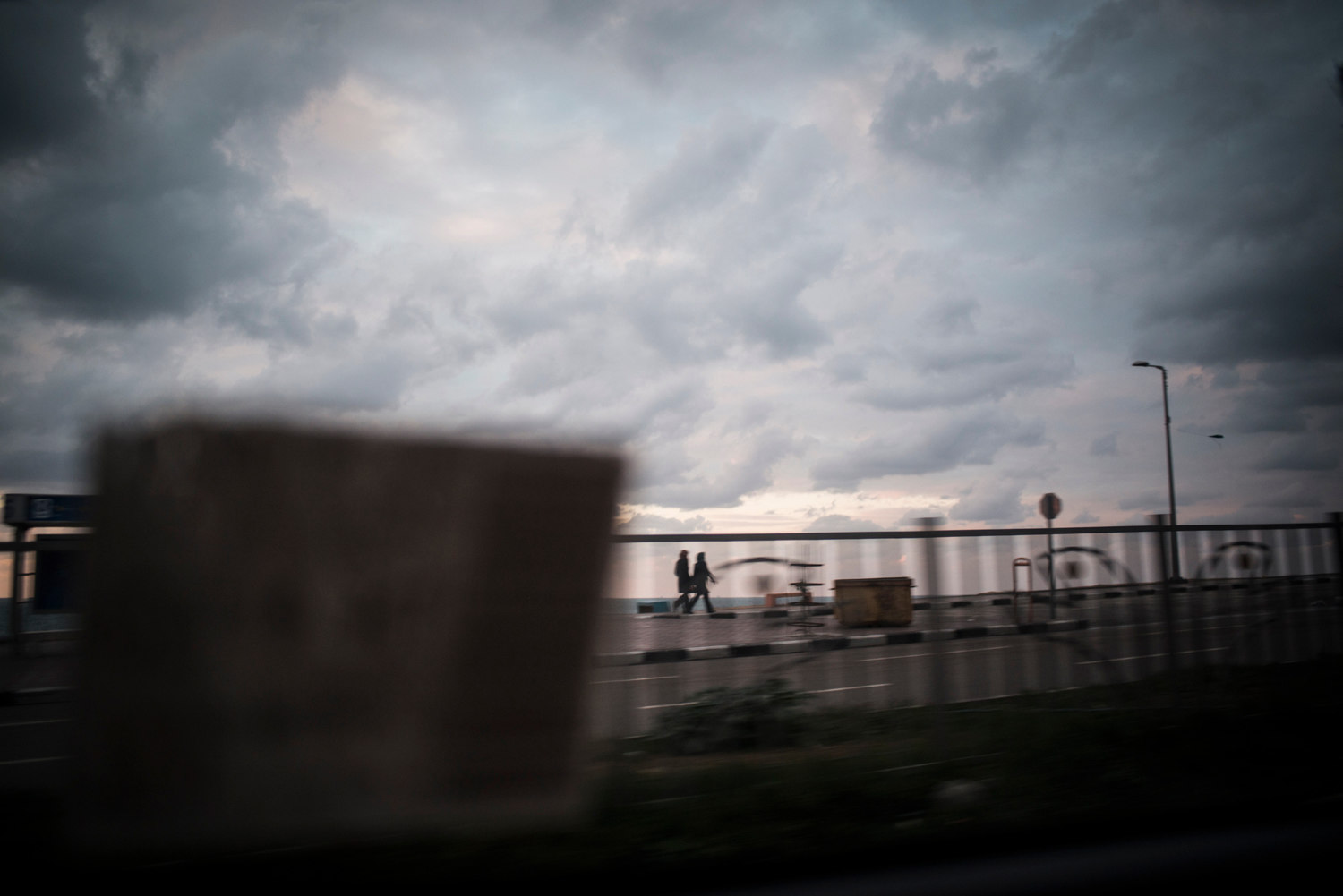
A couple walks along the beach road in December, Gaza City.

Madleen Koolab takes Gazan's out for rides on Thursday nights, a popular night for families. Madleen owns the boat and uses it to fish during the week.
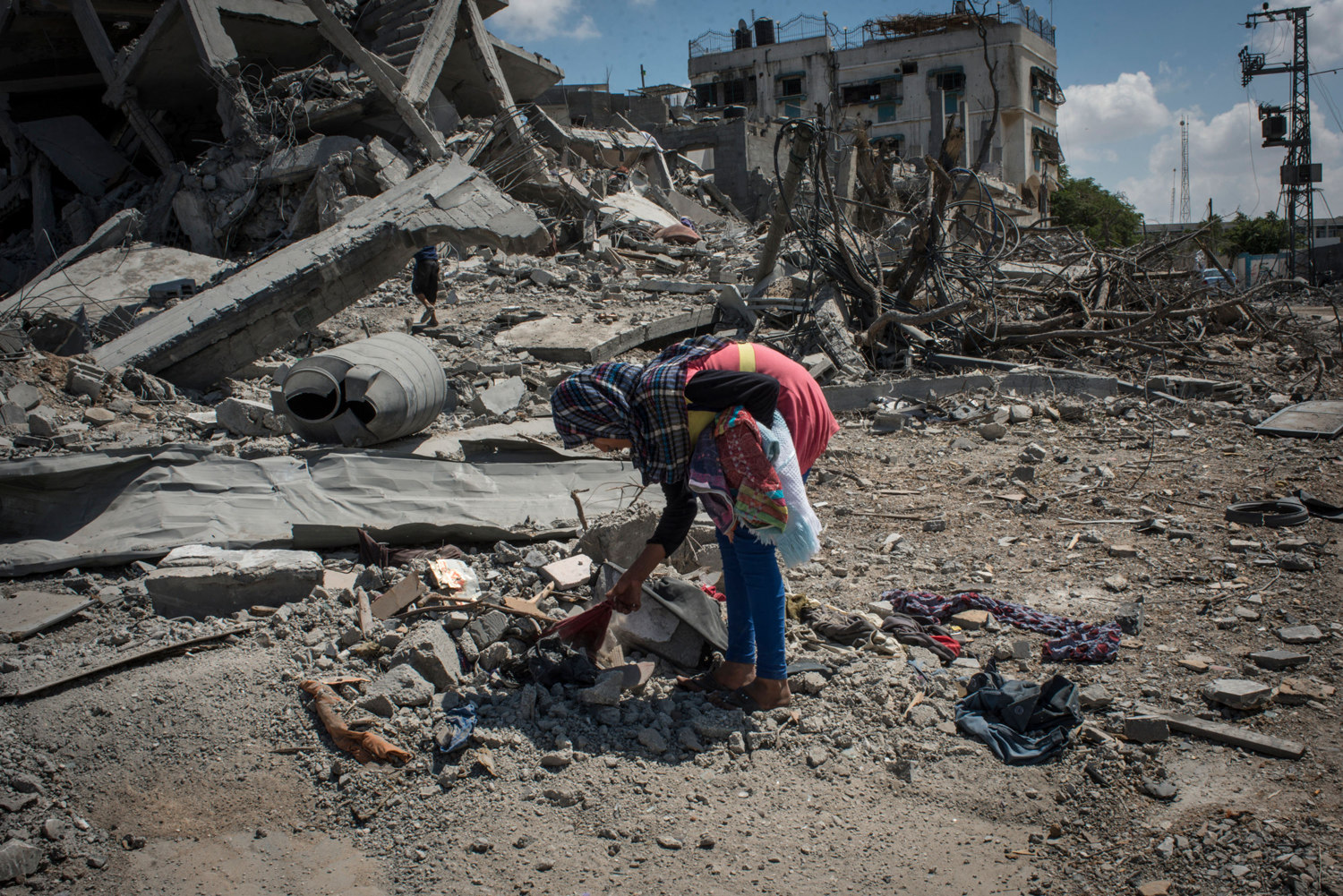
A girl picks through the rubble at what was previously her families home in Beit Hanoun, Gaza.































For many Gazans the sea is the only place they can be without being reminded of their isolation. Female Surfer, Sabah Abu Ghanem ,14 and her sister surf early in the morning outside of Gaza city. The sisters place first in many competitions inside the strip, but have never left the Gaza Strip to compete.
A girl shows off her Palestinian themed nails after a recent bombing campaign.
Medical students from Islamic University on break in the Maternity Ward of Al-Shifa Hospital in Gaza.
A woman walks by an mural discouraging domestic violence outside if Al-Shifa hospital. According to a 2012 study, some 37% of women are subjected to domestic violence by their husbands.
Haneen Harara, 15, and her sister Yasmeen Harara 6 cry upon seeing their family home for the first time. The sisters have lived in this house their whole life and have no where else to go. They are currently living in a UN shelter.
A family packs up to leave the Beit Hanoun area during a ceasefire in 2014.
Yara and her friends prepare a dance number during a blackout. Fuel is scarce in Gaza and many families only receive six to eight hours of electricity a day.
At a salon in Gaza City women come to get their hair, nails, and makeup done before weddings. In many families, a woman is not allowed to be seen without a veil by a man outside of her family, so beauty salons are for women only.
Girls play football in the Northern Gaza town of Beit Lahiyah. Women in Gaza typically do all types of sports till the age of 16, when family pressure forces them to stop as many families seek to find husbands for them.
Hadeel Fawzy Abushar 25 records a song in a studio in Gaza City. Few female singers remain as families and local government look down on the practice. Hadeel started when she was 12, as all of her sisters are singers.
Young women train to be in the police force. Hamas prides itself on its female police force, who are helpful with domestic violence issues and law enforcement.
Girls watch the sun set at the harbor in Gaza City. While living in Gaza is undeniably tough, being a woman there is harder.
During heavy shelling in the southern city of Rafa, Marwan spends time with her niece, children and extended family who have been evacuated to her house. Three families are now living where one lived previously and there are 60 people in the building.
Yara and her brother waiting for their father to return with schwarma as an evening treat after a recent conflict ended.
Girls living in a UNHCR shelter share a brief moment of fun between the shelling. In November 2010 when the Israeli Army heavily bombed parts of Gaza, refugees waited the siege in a United Nations Relief Works Agency school in Gaza City.
Few girls in Gaza are uncovered, here Doaa carefully does her hijab before leaving the house.
Haneen Harara, 15, and her sister Yasmeen Harara 6 cry upon seeing their family home for the first time. The sisters have lived in this house their whole life and have no where else to go. They are currently living in a UN shelter.
Doaa calls her mother in Tel Aviv during a blackout. Many hospitals in Gaza cannot care for severly sick or wounded people and they are transferred to hospitals in Israel. Her mother is escourting her grandson whos pancreas has burst.
A young girl hold up a sign saying 'I really miss my dad. Bring him back home' at weekly protest for women against the partition of Gaza and the West Bank.
Doaa in a friends bedroom. Girls that are un-married have few places to be themselves. Bedrooms and private cars are sanctuaries where girls can sing and dance without being judged by the public, or their own families.
Female drivers are rare but some liberal families allow their daughters to drive. Here Meera, has her own car and drives freely.
A nurse looks out the window of a hospital in Rafah waiting for more ambulances to bring in corpses after the ground invasion in Gaza.
A girl picks through the rubble at what was previously her families home in Beit Hanoun, Gaza.
Nisreen Shawa, a worker for the Palestinian Medical Relief Foundation at the Hamza Bin Abd-el Muttalib School where they do art therapy and exercises with girls after the recent bombings.
In the women's prison in Gaza, inmates who are pregnant, or have young children must take them with them when they are imprisoned, if a family member will not care for their children. Often the woman is shamed by her family and they won't care for the child. Many children grow up in jail this way.
Doaa takes a picture of herself in a trendy cafe in Gaza City.
Girls play Basketball at the Gaza Athletic Club, one of the oldest sporting clubs in the country. The practice is sponsored by PACES, a charity that works to get girls active. Women in Gaza typically do all types of sports till the age of 16, when family pressure forces them to stop as many families seek to find husbands for them.
Nurses at Al-Shifa hospital clean and weigh two newly born baby girls. As most families put pressure on having many male children, the arrival of a girl is celebrated, but not as much as a male child as males are the heads of the house and breadwinners.
A couple walks along the beach road in December, Gaza City.
Madleen Koolab takes Gazan's out for rides on Thursday nights, a popular night for families. Madleen owns the boat and uses it to fish during the week.
A girl picks through the rubble at what was previously her families home in Beit Hanoun, Gaza.